

2025 VCE Student Policy Handbook



Policy Development and Management
Document Title: VCE Student Policy Handbook
Policy No: 4
Date of First Issue: 30th January 2017
Last Review Date: June 2024
Document Author: Principal
Authorised By: Committee of Management
Next Review Date: June 2025
Northside Christian College is a small school with big ambitions for each student. The College is set in a tertiary education precinct in the City of Whittlesea in Bundoora, Victoria Northside provides engaging learning opportunities for students from Prep through to Year 12 with the mission to transform lives through Christ and the wonder of learning. We provide an innovative learning framework within a safe and supportive Christian environment. Our College community invites you to join us as we partner with your child on their educational journey.
The College provides a number of pathways at the senior levels of the school including a comprehensive range of VCE subjects, the VCE VM, and access to VET programs, VSV and VSL Language extension. Students participate in VET courses through the Northern Melbourne VET Cluster. The Whittlesea Tech School is located within driving distance, two major universities (La Trobe and RMIT) are with 10 minutes of the College and Melbourne Polytechnic is a short drive away.
A partnership between parents, staff and students is encouraged to support student success. Care is taken to engage parents in conversations about pathways planning through Morrisby counselling, Student Support Groups, Parent-Student-Teacher Interviews, Individualised Learning Plans as required, coordination with Student Wellbeing officers and targeted pathways and wellbeing appointments.
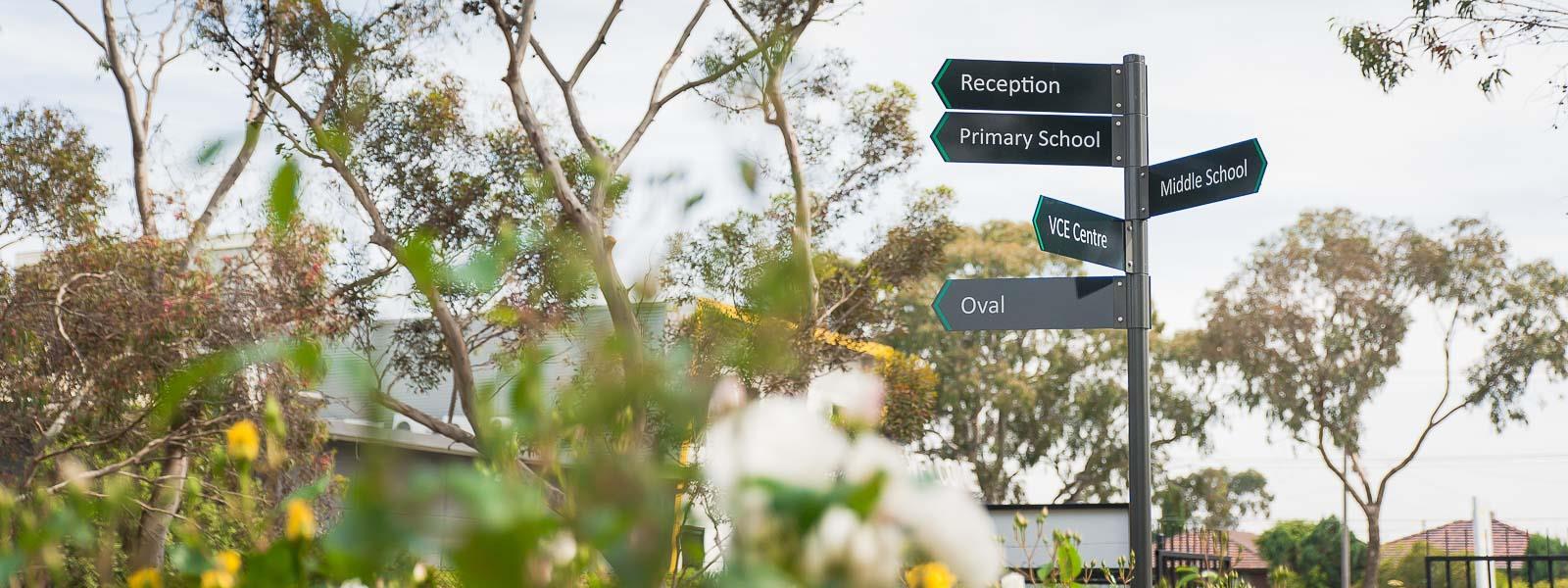
Please Note:
The Northside Christian College VCE Student Policy Handbook 2025 draws on information published by the Victorian Curriculum and Assessment Authority (the Government body responsible for accrediting the VCE and VCE VM).
The Victorian Curriculum and Assessment Authority guidelines may be found in the ‘VCE Administrative Handbook’ available on line at: https://www.vcaa.vic.edu.au/administration/vcehandbook/Pages/index.aspx
Advice on matters related to the administration of Victorian Certificate of Education (VCE) assessment is published annually in the VCE Administrative Handbook. Updates to matters related to the administration of VCE assessment are published in the VCAA Bulletin.
This Policy Handbook is for students studying VCE studies in 2025 and should be retained for reference throughout the 2025 academic school year.
Any questions relating to the Senior School program at Northside Christian College should be directed to the Director of Learning – Senior School, Mrs Lenna Waters or the Principal, Mr Michael Bond.
Background Information
Northside Christian College is a non-denominational, coeducational, Christian College that commenced in 1979. The College is committed to providing high quality Christian Education in a caring, encouraging, learning community to families of Melbourne’s northern suburbs. We aim to maximise the potential of every child, equipping them for lifelong learning and developing their character based on Biblical values.
Our mission: ‘Transforming lives through Christ and the wonder of learning’, articulates the College’s commitment to preparing a generation for lifelong learning in order that they might have the capacity to make a positive difference in their community. Through the design and structuring of the College’s learning programs and state of the art learning environments, the College community is well equipped to nurture and develop the unique talent, gifting and interests of every child.
The College aims to challenge each student to achieve their best, while providing students with an opportunity to study a broad range of subjects. The College curriculum, while developed to meet the requirements of the Australian Curriculum Framework and Government requirements, provides students with a great opportunity to study subjects across a wide range of learning areas. The College has developed the school curriculum to place a significant emphasis on Literacy and Numeracy.
As a Christian Learning Community we have over forty years of tradition in educating our students to live out the timeless values of perseverance, humility and integrity, preparing our young people for meaningful and purposeful engagement in every area of their lives.
Our Student Leadership Program provides opportunities for students to develop and put into practice their leadership potential in serving their fellow students and the wider community. We seek to be a ‘school without borders’, and increasingly work alongside local universities, local Tech Schools and other organisations to maximise access to high quality learning environments.
The Prep to Year 12 learning community at Northside Christian College has a small village feel; a nurturing and caring environment where every child is valued. Our programs are designed to meet students’ individual needs, whatever they are, seeking to ensure that every child’s unique, God-given qualities are developed. High value is placed on the development of resilience, leadership and character through the College.
Our VCE program offers students small classes and an individualised approach to supporting learning. For a growing family-friendly school, we offer a remarkable range of learning and cocurricular opportunities. The College also offers the Victorian Certificate of Education Vocational Major for students in Years 11 & 12. The VCE and VCE VM also includes acceleration pathways for eligible students in Year 10
The College honours the faithful pioneers from Northside Christian Centre (now Encompass Church) who took hold of God’s vision and planted the College in 1979. We look to the future with hope, confident of our calling and determined in our commitment to train a skilled and Godly generation of young people to take their place in the community, living purposeful lives in God’s service.
Northside Christian College is a member of Christian Schools Australia, a National body with member schools in all states.
It is our prayer and desire that every student will have a positive experience at school. A positive experience involves students developing healthy relationships, achieving their personal best, maintaining physical and emotional wellbeing and developing a greater understanding of Christian faith and character.
Mission Statement
Transforming lives through Christ and the wonder of learning.
Vision Statement
To be an inspirational Christian learning community.
Core Values
“Three things will last forever faith, hope, and love and the greatest of these is love.”
1 Corinthians 13:13
Image: Northside Christian College Core Values
Our Philosophy

Northside Christian College provides students with Primary and Secondary educational opportunities based on Christian values, designed to develop students’ knowledge, skills, understanding and character.
We believe every student is made uniquely in the image of God. Therefore, the individual needs of each student are our greatest concern. Within a Christian context at Northside Christian College, we aim to nurture the growth and development of the whole person – intellectually, physically, emotionally, spiritually and socially. We believe that this growth should be firmly based on the student's growing personal relationship with God and other people.
The development of students at Northside Christian College takes place in community. Our College is built on shared foundations of Biblical faith, values and beliefs and a commitment to mutual care and respect. We see our role as forming partnerships with parents and carers to educate their children.
We believe that in order to develop students to their full potential the College must ensure that all aspects of the child’s health and wellbeing are supported. We believe students should be nurtured in a supportive environment that has clear boundaries within mutual respect and a healthy working relationship between parents and carers, teachers and students. Respect involves treating other people as you would like to be treated yourself. The College implements a discipline program which aims for the restoration of relationships. We are committed to embedding a culture of child safety, including a zero tolerance of child abuse within our school.
Northside Christian College aims to offer an education that encourages both academic learning and the development of Godly values and wisdom. These values help to form the foundations for life and are vitally important to the development of each student. The presentation of these values in the curriculum and their demonstration in the lives of our staff serve to reinforce what is taught at home and in the family church.
We encourage students to be active participants in their educational journey. The College is committed to supporting each student through collaborative and differentiated approach in order to meet their learning needs.
Enactment of the College Philosophy
The College Vision, Mission, Values and Objectives are central to all practices within the College and form the basis of the College’s Strategic Plan and Annual Action Plan.
The College Philosophy is communicated to the students, parents, staff and the College community through key documents and publications. These include but are not limited to:
• Annual Report
• College Website
• Primary School Handbook
• Middle School Handbook
• Senior School Handbooks
• Staff Induction Program and Staff Handbook
• College newsletters
It is expected that all school improvement strategies and organisational practices relate to the College Philosophy in alignment with the Vision, Mission, and Objectives of the College.
The Committee of Management review written policies on a continuing basis to ensure consistency with the College’s Vision, Mission, Philosophy, and Objectives. Policies are also reviewed and revised as a result of newly enacted state and/or federal legislation, as a result of research and/or policy development as presented by state and/or national organisations and agencies, or for other reasons as determined by the Committee of Management.
Statement of Democratic Principles
Northside Christian College was established in 1979 within the guidelines for the establishment of a school within the State of Victoria. The College is committed to compliance with State and Federal Law and adherence to the policies and expectations of legally appointed authorities that oversee the operation of educational institutions in this State. In this regard, we recognise:
1. The principle of elected government at Federal, State and local levels of government;
2. The rule of Law, and the right of the parliament and legal authorities to make and enforce compliance with that Law;
3. The equal rights of all people before the Law;
4. The freedom of religion;
5. The freedom of speech and association;
6. The values of openness, inclusion and tolerance.
We further state that the College strongly supports and applauds the Government’s recognition of the right of faith-based schools to actively teach and model the beliefs, tenets and practices of the faith and to employ staff who actively practice and live by them.
Objectives
Northside Christian College aims to:
• Provide an education of a high academic standard that is based on an acceptance of the Lordship of Christ, and an acceptance of the Bible as the revealed and inspired word of God;
• Cater for the individuality of the learner and their gifting in God and stress the function of the learner as a member of the Body of Christ and the College community;
• Train the learner in the moral and ethical standards of the Bible and assist them to acquire a Biblical world and life view and an appreciation of the rights of others to hold differing views;
• Develop the learner’s creative capacity, critical thinking ability, leadership skills and ability to work interdependently with others to solve problems and serve the community;
• Foster self-discipline in the learner through goal setting, responsibility and self-motivation;
• Stress cooperation rather than competition and foster the development of the gifts, skills and abilities of the learner for the service of Jesus Christ in the Body of Christ and the community;
• Develop enhanced partnerships between parents, students, staff and the community with the intention to strengthen the teaching and learning process;
• Provide a safe and loving environment through a sense of belonging to the family of God;
• Develop a culture of continuous improvement, professional development and pastoral support among staff and the College community;
• Ensure effective stewardship of the assets and resources God has entrusted to the College;
• Effectively communicate with parents and the wider community.
Welcome from the Principal
Dear Students and Parents,
The Senior School years provide our students with a wonderful opportunity to prepare themselves for their chosen pathway. Hard work and dedication during these years can provide a wide range of rewarding opportunities during the next few years. I wish to encourage our students to aim high and attempt to regularly achieve their personal best during these Senior School years.
The Senior School students at Northside Christian College are prompted to embrace the challenges of their Year 10 – 12 studies. The VCE can present significant challenges in terms of increased workloads, multiple deadlines, and the pressure of assessments and examinations. Students are encouraged to approach these challenges with a clear focus, dedication, and a determination to achieve their personal best
There has been a great deal of research and material published on managing stress and the pressures of challenges such as the VCE. Students are encouraged to manage their time well and consider the balance between study, work commitments, regular exercise, family life, and other social pursuits. Developing a good habit of eating well, staying hydrated, praying, and maintaining good sleeping habits all contribute to our ability to manage the demands of stress. Students are also advised to create a dedicated study space and develop a study timetable that is shared and discussed with their parents. We are grateful our students are also supported by mentors, our Student Wellbeing Team, and Inclusive Education Team at Northside.
Completing Year 12 is a special achievement; however, achieving excellence is tough and demanding. Students are encouraged to set goals for the year and work diligently towards achieving them. The staff at Northside Christian College look forward to supporting each student in their attempt to achieve their own personal academic goals.
This VCE Student Policy Handbook contains essential information regarding the VCE policies and procedures of both the VCAA and Northside Christian College. Knowledge and application of its contents will prevent many unnecessary problems throughout the year.
We wish you every success and God’s blessing as you take on the responsibilities of being a Senior School student at Northside Christian College. We pray you feel supported and challenged to achieve your personal best.
Working together,

Michael Bond Principal
1.0 Introduction
This handbook provides helpful advice for Northside Christian College Victorian Certificate of Education (VCE) students and parents. It will provide you with invaluable information as you proceed through the VCE. This handbook provides policies related to the VCE; make sure you read them carefully. Keep this document on hand and in a safe place as you will need to refer to it throughout the year.
Parents and students are required to read this document and complete the Parent and Student Declaration Form at the commencement of each academic year (Appendix A). These policies outline the requirements that students must adhere to in order for the VCE to be awarded. Further clarification and explanation is available on the Victorian Curriculum and Assessment Authority (VCAA) website or by appointment with the VCE Learning Coordinator
Northside Christian College has high expectations of its students, in particular its Senior School students. The College must be able to rely on its Senior students, both within and outside of the College environment. In all circumstances students are expected to act in a mature and responsible manner. All Senior School students are expected to follow College rules and policies. Senior School students are expected to wear the College uniform correctly.
The VCE years provide an opportunity for students to further develop leadership skills and to serve as role models amongst younger students. As a result, VCE students are expected to undertake leadership roles within the College community. There are many avenues for Senior School students to present themselves in this manner and it is expected that students will make the most of these opportunities to participate in the life of the College community.
Key Contacts
The following people can be contacted if questions are of a general nature:
Principal
Director of Learning – Senior School
Careers and Pathways Coordinator
Director of Inclusive Education
Head of Student Wellbeing
Mr Michael Bond
Mrs Lenna Waters
Mrs Lenna Waters
Mrs Serene Eng
Mrs Heather Cootee
2.0 Commonly Used Terms
Assessment of level of performance
Assessment of levels of performance in Units 1 and 2 is the responsibility of the College. The VCAA supervises the assessment of all students undertaking studies at Units 3 & 4 level.
Assessment Task
A task set by the teacher to assess students’ achievements of unit outcomes for Schoolassessed Coursework (see also Outcomes). This can be a SAC or a SAT
ATAR - Australian Tertiary Admission Rank
The Australian Tertiary Admission Rank (ATAR) is a number from 0.00 to 99.95, which represents a student’s rank in comparison with other students completing VCE in that same year. It is calculated using a student’s Unit 3 & 4 scaled study scores, and is used by universities and TAFEs to select students for courses A minimum of 4 studies must be scored to receive an ATAR.
Authentication
The process of ensuring that the work submitted by students for assessment is their own.
Breach of rules
Students are expected to abide by both College policy regarding the VCE, and sign a declaration agreeing to abide by VCAA rules. If the rules are not adhered to in any way a variety of penalties are applied, depending upon the situation.
Derived Examination Score (DES)
Provision available for students who missed an external Unit 3 & 4 examination or whose external Unit 3 & 4 examination performance has been impaired due to illness or other personal circumstances.
External Examinations – Unit 3 & 4
External assessments set and marked by the VCAA. All VCE Units 3 & 4 studies have at least one examination. Most written examinations are held in October and November. Performance examinations and oral examinations are held in October.
GAT - General Achievement Test
All students enrolled in one or more Unit 3 & 4 sequence must sit the General Achievement Test (GAT). This is a general knowledge test used by VCAA to verify school-based marks. The GAT score itself does not count towards the end of year results, but it is an important part of the moderation process. The GAT consists of Part A and Part B.
Outcomes
What a student must know and be able to do in order to satisfactorily complete a unit as specified in the VCE study design.
Prerequisites
Subjects which must be completed for admission to tertiary courses. In addition, Unit 3 is a prerequisite for all Unit 4 subjects.
Redemption
Providing a student with an opportunity to complete a further assessment task in an area where their performance was previously unsatisfactory.
SAC - School Assessed Coursework
The tasks or activities that teachers use to assess whether a student has met the outcomes they need to in order to satisfactorily complete the unit of study. They are typically conducted at school in test conditions over one or two lessons. Units of study will usually have at least three SAC’s, although this can vary from unit to unit.
SAT - School Assessed Task
More practical units such as Art Making and Exhibiting, Media and Visual Communication and Design for example, include assessments that take longer to complete than one or two lessons. In fact, they are often completed through the duration of the unit. These assessments are called School Assessed Tasks, or commonly, SATs.
Satisfactory Completion
Decision made by the College that a student has demonstrated achievement of outcomes for a unit. Students receive an ‘S’ for the satisfactory completion of a unit. If they do not satisfactorily complete a unit, they receive an ‘N’ indicating ‘not satisfactory’ A ‘J’ result is used when the student is no longer attending classes and has not submitted work for assessment. Where a student receives ‘N’ or ‘J’ for one or both Units 3 & 4 sequence, the student will not receive a Study Score for the study. VTAC policy is that the study will not contribute to the student’s ATAR.
Scaling
The statistical process used to determine the degree of competition in each study by comparing the performance of the entire group of students in a study with their performance in all other studies in which they have achieved a study score.
Special Provision
Special arrangements that are made to allow students who are experiencing significant hardship the maximum opportunity to demonstrate the required knowledge and skills for a unit of study.
Semester
Equivalent to half a school year or two terms.
Sequence
The sequence is the order in which a student completes Units. For example, a student must study Units 3 & 4 in sequence.
Special Entry Access Scheme (SEAS)
The Special Entry Access Scheme (SEAS) is the umbrella program run by most institutions for applicants who have experienced educational disadvantage. The program allows selection officers to grant extra consideration for course entry to applicants, but it is not used as a replacement for course entry requirements. Students apply for SEAS through VTAC
Special Examination Arrangements
Arrangements that are approved to meet the needs of students who have severe disabilities, illnesses or other circumstances that would affect their ability to undertake external examinations to their best ability.
Statement of Results
The document issued by the VCAA showing whether a student has successfully completed the VCE. It shows the graded assessment and scaled study scores for each sequence of Units 3 & 4 and a record of achievement (S or N) for all VCE subjects undertaken.
Statistical Moderation
The process used to ensure that schools’ Unit 3 & 4 assessments are comparable throughout the State. It involves adjusting each school’s coursework scores for each study to match the level and spread of the combined examination and GAT scores for the students in that school doing that study.
Study Design
A Study Design for each Unit 3 & 4 VCE study is published by the VCAA. It specifies the content for the study and how student work is to be assessed. Schools and other VCE providers must adhere to the requirements in the Study Designs.
Study Score
A Study Score is a number out of 50 that provides an indication of how well the student has completed the subject compared with all other students who were enrolled in that subject. It is based on students’ results in school assessments and examinations.
Unit 1 and 2
Units within a VCE study designed to approximate the Year 11 level of difficulty.
Unit 3 and 4
Units within a VCE study designed to approximate the Year 12 level of difficulty.
VASS - VCE Administrative Software System
The Internet-based system used by schools to register students and enter VCE enrolments and results directly onto the VCAA central database.
VCAA - Victorian Curriculum Assessment Authority
The statutory body responsible for providing curriculum and assessment for Victorian students, including the Victorian Certificate of Education.
VCE - Victorian Certificate of Education
The qualification achieved by students in Victorian schools who satisfactorily complete at least 16 units of study including at least three of English, and three sequences of Units 3 & 4 other than English. Units of study are semester (half a year) length.
VCE VM – Victorian Certificate of Education Vocational Major
The VCE Vocational Major is a new vocational and applied learning program that sits within the VCE. The VCE Vocational Major is the replacement for the Intermediate and Senior VCAL. It is a two- year program over Year 11 and 12. Students who complete the VM achieve the VCE certificate with a Vocational Major appellation.
Vocational Education and Training (VET)
Nationally recognised vocational certificates that are integrated within the VCE.
VTAC - Victorian Tertiary Admissions Centre
The Victorian Tertiary Admissions Centre acts on behalf of Universities and TAFEs to coordinate the tertiary application process for Year 12 school leavers. VTAC is the body that calculates, distributes and utilises the Australian Tertiary Admission Rank (ATAR).
3.0 Introducing the Victorian Certificate of Education (VCE)
Beginning in 2023, Victoria transitioned to a new integrated senior secondary certificate that brought together the two senior secondary certificates, the VCE and Victorian Certificate of Applied Learning (VCAL) under one banner of VCE.
The new program is named the VCE Vocational Major. In 2025, only students committed to undertaking the VM until graduation are allowed to enrol in the VM subjects. The VM alternative will give all students the learning opportunities to develop the skills and capabilities needed to support their transition into further education, work, and life.
The Victorian Certificate of Education (VCE) is a well-recognised and valuable acknowledgement of achievement for students. Successful completion provides students with an opportunity to seek access to tertiary institutions as well as providing information to employers about a student’s ability to cope with a wide range of complex tasks, meet deadlines and apply knowledge and skills to various problems.
The main aim of the College is to assist the student to develop sound working habits so that all VCE studies undertaken are satisfactorily completed.
The VCAA requires details regarding the satisfactory completion of Outcomes and School Assessed Coursework (SACs) for each unit. As a requirement of the courses set down by the VCAA, policies have been established to ensure that the correct procedures are carried out in all schools.
4.1 Vocational Major
For students aiming to enter the workforce via an apprenticeship or study at TAFE, Northside Christian College offers the VCE Vocational Major (VCE VM) as an appropriate pathway and an alternative to the VCE.
Beginning in 2025, the two programs (VCE and VCE VM) will be fully integrated with students from the VCE stream allowed to undertake VM subjects if there is room in their timetable. It is worth noting that VM subjects are non-scoring subjects and this needs to be factored in when a student desiring an ATAR score undertakes a VM subject.
More information about the VM Program is provided in Section 4.1.
4.0 Overview of the VCE
The VCE is made up of a series of studies, each of which is divided into units that require one semester to complete. Generally, Year 11 students will complete Units 1 and / or 2 of their chosen studies, whereas Year 12 students will complete Units 3 & 4 (which must be studied as a sequence). It is quite common however, under the College’s VCE Acceleration Program, for Year 10 students to study a Unit 1 & 2 sequence and then study the Unit 3 & 4 sequence of that same subject whilst in Year 11.
It is expected that Year 11 students will undertake 12 Units of Study, of which a Unit 1 and 2 course from the English group is compulsory. These 12 units may include a Unit 3 & 4 acceleration subject, according to availability.
It is expected that Year 12 students will undertake 10 Units of Study, of which a Unit 3 and 4 course from the English group is compulsory. Should a student have already completed a Unit 3 & 4 acceleration subject, they will still be encouraged to complete a minimum of 10 Units of Study in their final year of school. (Under extenuating circumstances, for example ongoing illness, it may be possible for the VCE Learning Coordinator and Deputy Principal to grant permission to a student to study less than the recommended 10 Units of Study in Year 12. This will remain at the discretion of the College and will always be considered in accordance for the best possible outcomes for the student).
For each student, completion of the VCE means satisfactorily completing the following:
• A minimum of 16 Units, including at least 3 from the English group (including a sequence of Unit 3/4); and
• at least 3 additional sequences of Unit 3–4 studies, which can include further sequences from the English group.
These are the minimum requirements as outlined by the VCAA. The College expectations allow students greater flexibility in their VCE program.
Each study is conducted according to the VCAA Study Designs, details of which will be given to the students by their teachers at the start of each unit of work. Current Study Designs are also available on the VCAA website.
The program chosen by each student should reflect the career and / or tertiary aspirations of that student. Careful career counselling with the Director of Senior School / School Career Practitioner will be undertaken prior to selecting subjects.
Summary of Subject Selection Guidelines
Students at Northside Christian College are advised to complete the following:
• Year 11 students select six subjects.
• Year 12 students select five subjects.
Tertiary prerequisites are available in the Victorian Tertiary Admissions Centre (VTAC) publications, which are available online at https://vtac.edu.au/. They are also available from individual tertiary institutions. The VTAC advises that satisfactory completion of a scored Unit 3–4 sequence from the English group of studies is required for the calculation of a student’s Australian Tertiary Admission Rank (ATAR).
4.1 VCE - Vocational Major
The VCE – Vocational Major is a two-year vocational and applied learning program created within the Victorian Certificate of Education (VCE) aimed at Year 11 and 12 students that will replace Senior and Intermediate VCAL and offer a program that enables successful transitions into apprenticeships, traineeships, further education and training, or directly into employment. Within senior secondary education, vocational and applied learning builds critical and creative thinking, communication skills, teamwork and collaboration, curiosity and innovation. It provides students with real-world knowledge, including about the workplace, and practical and transferrable skills.
The VCE Vocational Major (VCE VM) will support students to develop both academic and practical skills. It employs a more diverse range of assessment strategies rather than exams, alleviating some of the pressure that students face when considering the VCE, whilst still enabling students to successfully gain a VCE satisfactory completion.
Students must complete a minimum of 16 units to meet the requirements for the VCE certificate with a VCE Vocational Major which include:
Year 11
• Unit 1 and 2: Literacy or Unit 1 and 2 VCE English (i.e. Unit 1 and 2 English).
• Unit 1 and 2: Numeracy or VCE Mathematics (i.e. Unit 1 and 2 Foundation or General Mathematics).
• Unit 1 and 2: Work Related Skills and / or Personal Development Skills.
• VET Certificate II or above (Minimum of 90 hours of completed units).
• Students may undertake Structured Workplace Learning (SWL) or a School-Based Apprenticeship or Traineeship (SBAT).
Year 12
• Unit 3 and 4: Literacy or Unit 3 and 4 VCE English (i.e. Unit 3 and 4 English).
• Unit 3 and 4: Numeracy or VCE Mathematics units.
• Unit 3 and 4: Work Related Skills and / or Personal Development Skills.
• VET Certificate II or above. (minimum of 90 hours of completed units.)
• Unit 3 and 4: Elective if desired (selected by students).
• Students may undertake Structured Workplace Learning (SWL) (2 units may be earned) or a School-Based Apprenticeship or Traineeship (SBAT) if their program allows.
Students aiming to complete the VCE VM will need to indicate this on their subject selection form and meet with the Director of Senior School Learning to discuss VET studies and pathway planning in Year 10
Students enrolled in the VM achieve their VCE and meet the requirements for the VCE VM when they successfully complete course requirements and achieve an S for a minimum of 16 units (Including both Unit 1 & 2 and 3 & 4 subjects) over their VCE years including the following:
• Three Literacy or VCE English units (including a Unit 3 and 4 sequence).
• Three other unit 3 and 4 sequences in total including:
• Two Numeracy or VCE Mathematics units.
• Two Work Related Skills units.
• Two Personal Development Skills units.
• 180 nominal hours of VET at Certificate II level or above.
• May also include 2 Unit 1,2 units from Structured Workplace Learning if enrolled in the subject Structured Workplace Learning subject and completing a minimum of 80 hours of SWL.
Students may also include other VCE subjects. Most students will undertake between 16-20 units over the two years. They may also undertake other VCE subjects as allowed by the timetable or by distance education, and structured workplace learning.
4.2 Changes in Course Selection
There may come a time when a student wishes to reassess their chosen VCE subjects and the direction they are heading. Students are reminded of the importance of clarifying whether there are pre-requisites for their intended career and further study pathway. Universities and TAFE Institutions provide published lists of pre-requisites for all tertiary courses. Students should ensure that these pre-requisite studies are included in their program at the Unit 3 and 4 level. For further information, please refer to the relevant VTAC Prerequisites document located on the VTAC website. A copy is also available in the Senior School Office.
Any VCE subject selection changes need to be reviewed in light of a student’s chosen career and tertiary study pathways. Any potential changes to study selection must be discussed fully with parents, teachers and the VCE Learning Coordinator. The timing of these decisions is also important. Changes are best made prior to any classes commencing, ensuring that the student has not missed any subject content that may impact on success or study scores in the subject.
There are final dates each semester after which a change in subject is not permitted. Final dates are available on the Change of Unit Request Form. In most circumstances students will not be permitted to change a Unit 3 & 4 sequence after two weeks from the beginning of the year.
A Change of Unit Request Form (Appendix E) will need to be completed and signed before a change may occur. This generally involves changing from one study to another, although in extenuating circumstances, such as illness, it may be possible for a student to drop one subject altogether. Any changes require consultation between parents, student and the VCE Learning Coordinator before a decision is made. The decision will be made in accordance with the best possible outcomes for the student.
After extensive discussion, if any student wishes to discontinue their enrolment from VCE altogether, they must complete the College’s official exit form. This form authorises the VASS administrator to withdraw the student from the VCE program at the College. Students may also, in special circumstances change from an externally-assessed course to internally- assessed only course. (formerly known as scoring or non-scoring.)
There are no restrictions on students repeating units, but they may only obtain credit once for each unit. Students who repeat a unit are required to repeat the full unit, including all homework, tasks and assessments for the outcomes specified in the current study design for the year of repetition. Students wishing to receive a study score when repeating VCE units will need to satisfactorily complete both Units 3 and 4 in the year of repetition, as well as undertake the written exam.
4.3 VCE Attendance Policy
The VCAA places the onus on the determination of ‘satisfactory attendance’ with individual schools. Northside Christian College’s requirements in relation to VCE attendance are explained in this section. Unsatisfactory attendance can result in non-satisfactory completion of a unit.
The VCAA advise that all VCE units involve at least 50 hours of scheduled classroom instruction. A student needs to attend sufficient class time to complete work. If a student has completed work but there has been a substantial breach of the school’s attendance policy, the school is unable to authenticate the students work and where the school chooses to assign an N result for the unit, the school must assign an N for the outcome which cannot be authenticated.
Students are expected to attend all time-tabled classes, excursions, College and Year Level Assemblies, including Chapel services, and be punctual at all times. The College policy is a minimum required class attendance of 90% (unless acceptable explanations are provided) for each unit of study during a semester. All subject teachers will mark a class roll during each lesson.
Attendance of VCE classes is extremely important, being absent from a class will mean missing key subject content and information and valuable contact time with the teacher. If students are absent from class during a SAC they risk the non-achievement of a score for that particular task. It is for these reasons that the College has specific requirements when it comes to providing evidence for the reasons a student is absent.
If a student’s absence is known in advance:
• There are some circumstances where a student may know in advance that they will be absent on a particular day. Please note that the only acceptable reasons for these types of absences are in the case of serious events for which there can be no possibility of scheduling outside of College hours. For example, a medical procedure or attendance at a funeral.
• It is important to note that driving lessons / tests, part-time work and family holidays are not acceptable reasons for an absence, as these are events that can be scheduled outside of College hours. If a parent / guardian believes there may be extenuating circumstances surrounding the need for a student to be absent from classes, they should contact the VCE Learning Coordinator and discuss the appropriate course of action.
• In the event of an acceptable reason for a student to be absent the VCE Learning Coordinator should be notified in writing as soon as is practical. Substantiation in the form of a medical certificate / letter, or funeral notice will need to be provided within three (3) days of returning to school.
• When a student will be, or proposes to be, absent from school for an acceptable reason on the day of a SAC, an ‘Alternative SAC Request Form’ (Appendix D) must be completed and submitted to the VCE Learning Coordinator at least one week prior to the scheduled date.)
Other absences:
• The College is to be informed of the student’s absence by 9:30am on the day of absence by a parent / guardian, as per the Attendance and Roll Marking Policy (Policy No. 33) Parents wishing to report Student Absentee to Reception, please ring 03 9467 2477 before 9am. If the office is unattended, please leave a message. The College Administration will notify all relevant teaching staff, including the VCE Learning Coordinator of the student’s absence. Students will be aware if they were going to be undertaking an assessment on that day. In this case, the subject teacher should be personally notified, either by phone call or by email.
• If a student is absent due to a medical condition that involves a visit to a doctor or hospital, a medical certificate must be provided. As a general recommendation, we would
advise that medical certificates are routinely sought in any situation where a student attends a doctor that results, or may result, in any time away from school. If the medical condition does not involve a visit to the doctor or hospital, a note from a parent or guardian explaining reasons for the absence must be provided. If you wish to further discuss the need for a medical certificate, please contact the VCE Learning Coordinator. Accurate documentation regarding absences is vital to meet the 90% attendance policy and is also of benefit to students when matters of Special Provision are being decided.
• If a student is absent due to ill health or another medical condition during the assessment of an outcome, a doctor’s certificate must be provided upon the student’s return to school and lodged at the office for the records of the VCE Learning Coordinator. This student will need to request the opportunity to sit an alternative SAC Task using the ‘Alternative SAC Request Form’ (Appendix D).
• If a student is absent for reasons other than a medical condition, a note signed by a parent or guardian or another authority of relevance to the absence must be provided. It is important to note that these absences may or may not be considered acceptable, at discretion of the VCE Learning Coordinator and Deputy Principal.
Other information regarding attendance:
• All signed notes and medical certificates must be lodged at the office for the records of the VCE Learning Coordinator.
• Students need to attend sufficient class time to complete course work done mainly in class, which is necessary for authentication. (90%)
• Where students have completed work but there is a substantive breach of class attendance, the student may be awarded an ‘N’ (not satisfactory) at the discretion of the VCE Learning Coordinator.
• If a student is absent during a SAC for any reason, an ‘Alternative SAC Request Form’ must be completed and submitted to the VCE Learning Coordinator, who shall discuss the reasons for the request with the subject teacher. Each request for alternative SAC arrangements will be considered on its merits and approval of the request will be at the discretion of the VCE Learning Coordinator, in consultation with the subject teacher.
• If there has been no prior notification of the reason for the student’s absence during a SAC (either leading up to, or on the day) from the student, or parents / guardians of the student, then that student can be considered to have not demonstrated the outcomes concerned and should therefore be considered as needing to complete a redemption task (see section 5.13). Any grade / score for that particular SAC will be zero.
• If appropriate notification has been given (for example, notification from parent followed by medical certificate etc.) with subsequent approval from the VCE Learning Coordinator, then arrangements must be made for an alternate SAC to be completed as soon as practical and the score will not be affected.
• Attendance data will be gathered from each subject teacher at the conclusion of each term. Parents / guardians of students at risk of non-satisfactory completion as a result of non-attendance will be contacted by the VCE Learning Coordinator.
• Students with attendance below 90% will be required to make up the time lost from individual classes Subject teachers will set tasks for students to complete during the Attendance Redemption time. All time redeemed must be spent working on tasks. Time spent on the phone or socialising will not count toward attendance redemption. (See form in Appendix G)
• The VCE Learning Coordinator will file all notifications of student absences.
• As most coursework is presented and discussed predominately in class time, full attendance is vital for fulfilling the outcomes and completing the requirements of the VCE. It is the responsibility of any student who is absent to find out what work was covered during their absence and check Schoology for work that has been set during that time. The excuse, “I didn’t know because I was away”, is unacceptable.
Please also refer to the College’s Attendance and Roll Marking Policy (Policy No. 33).
4.4 VCE Acceleration Program
Students at Year 10 will be given the opportunity to undertake a Unit 1 & 2 sequence as part of an acceleration program. In Year 11, they then have the opportunity to continue in the Unit 3 & 4 sequence of the same subject. Specific subjects will be made available for acceleration and Year 10 students wishing to participate are required to apply using the appropriate Acceleration Application Form (Appendix F). Selection is dependant on the following criteria:
• Previous high achievement in related subject areas;
• Demonstration of a positive attitude and diligent approach to studies;
• Attendance at a selection interview with the VCE Learning Coordinator and subject teacher;
• Agreement and subsequent signature of parents/guardians on the application form;
• Availability of places in the subject;
• Favourable blocking of subjects in the timetable.
Please note that Year 11 students will be given preference in the event of limited enrolment places, and blocking considerations.
4.5 Administrative Matters and Student Privacy
• Students are asked to complete a Student Personal Details Form each year they are enrolled in the VCE. This enrolment information is stored on VASS. Students will be required to check the accuracy of the information at the beginning of the year. They will also sign a declaration saying that they will abide by VCAA rules and regulations regarding the VCE. (See Appendix A.)
Students will have the process and required information explained to them and assistance will be provided if necessary.
This information is maintained in VASS, the VCAA central database, and any hardcopies of the student’s details are kept in a secure location on the College premises.
• A student who does not identify as male or female may elect to have ‘self-described’ as their nominated gender identity on the Student Personal Details Form. The self-described gender category refers to any person who does not identify as either exclusively male or female, including people of non-binary gender.
The VCAA have advised schools that have students who are in the process of gender affirmation/transition that they should contact the Student Records and Results Unit for further advice in relation to recording student details on VASS and the reporting of their results.
From 1 May 2020, a student who has legally changed the sex that is recorded on their birth certificate, through the Births, Deaths and Marriages registry process, may present this birth certificate to their school (if under 18 years of age and currently in school) or to the VCAA (if over 18 and no longer in school) so that their record can be updated.
The VCAA is a Victorian public sector agency and required to comply with the Privacy and Data Protection Act 2014 (Vic).
Under the Privacy and Data Protection Act students have the right to request access to personal information held about them by the VCAA. Individuals seeking access to personal information held about them by the VCAA should email the VCAA Privacy Officer: vcaa.privacy@edumail.vic.gov.au. In some circumstances, an application under the Freedom of Information Act 1982 (Vic) may be necessary.
• The College must seek permission from students for their data to be forwarded to newspapers and other government bodies for the calculation of awards and prizes and for the Department of Education and Training (DET) On Track survey. This must be done for each academic year of enrolment.
4.6 Students Seeking EAL Status
The satisfactory completion of at least three units from the English group, including a Unit 3–4 sequence, is a compulsory requirement for achieving the VCE Students who are unfamiliar with the English language because they are from non-English-speaking backgrounds or who are deaf or hard of hearing may have access to English as an Additional Language (EAL) status. Students applying for EAL status should indicate this on their VCE Student Personal Details form. Identifying a student as having EAL status does not automatically enrol the student in EAL.
To apply for EAL status, each student is required to submit an ‘Application for Enrolment in English as an Additional Language Units 3 and 4’ form to the school. This is designed to assist schools in evaluating a student’s EAL status. Schools are advised the VCAA to not enrol a student in EAL unless they have received all documentation verifying that the student meets the EAL eligibility criteria. Students are encouraged to work closely with the Director of Senior School Learning to commence the process to determine EAL eligibility prior to commencing their VCE program to allow time to collect and assess the supporting documentation.
Students who are applying to seek EAL status must meet one of the three criteria outlined below.
1 A student:
• will not have resided in Australia or another predominantly English-speaking country for a total period of more than seven years prior to 1 January in the year the student will be undertaking Units 3 and 4 EAL* and
• has been enrolled in schools where English has been the student’s major language of instruction for a total period of seven years or less over the period of their education^
2 A student is an Aboriginal or Torres Strait Islander person whose first language is not English
3 A student is deaf or hard of hearing and meets the eligibility requirements
* The period of seven years is to be calculated cumulatively over the student’s whole life. The calculation of time spent in Australia is made from the date of last arrival plus any previous periods of time spent in Australia or any predominantly English-speaking country. Time spent out of Australia during school holidays should be included in the accumulation towards the seven years because there would have been no disruption to education during these periods.
^ Schools must sight the student’s overseas school reports to confirm that the language of instruction was not English during this period.
Special circumstances for EAL status
There are special circumstances that may be considered by the VCAA in determining a student’s eligibility for EAL status, including:
• minimal or no primary school education
• material interruptions to schooling during primary years, particularly if there were changes to the language of instruction
• material interruptions to schooling after arrival in Australia.
Circumstances not considered for EAL status
The following are not grounds for a special application for EAL status:
• the language spoken in the student’s home
• the standard of the student’s spoken and written English
• the failure of the student’s school to provide EAL assistance to the student
Determinations about EAL status
If a student clearly meets the criteria, the Principal has the authority to grant this provision. Such applications should not be sent to the VCAA; they should be retained on the school file. Students are advised that the VCAA may request copies of applications to confirm eligibility as part of an audit process.
If a decision is not clear, the Principal may apply to the VCAA for a determination using the Application for Enrolment in English as an Additional Language Units 3 & 4 form. If a determination is sought from the VCAA, the completed application form, together with all supporting documentation, should be forwarded to the Student Records and Results Unit as soon as possible (which should be in the year prior to undertaking Units 3 & 4 English as an Additional Language).
Students who have resided and studied in Singapore or India
VASS disables EAL approval for students whose country of origin is Singapore or India, even though the student may have resided in Australia for less than seven years. A message on VASS will appear, stating ‘EAL eligibility for this country of origin can only be approved by the VCAA’. The school must forward the application to the VCAA for a thorough assessment. These applications need to include supporting school documentation and passport stamp and/or international movement records, to determine whether the student is eligible for EAL status. If the application is reviewed by the VCAA, and the approval granted, it will be entered on VASS and the school will be able to enrol the student in English as an Additional Language. This application and supporting documentation should be forwarded to the Student Records and Results Unit as soon as possible (which should be in the year prior to undertaking Units 3 and 4 English as an Additional Language).
Students who are deaf or hard of hearing
Students seeking EAL status on the grounds of being deaf or hard of hearing must:
• produce evidence of a hearing test administered by the Australian Government Hearing Services Program, or an equivalent body, not more than two calendar years before the year of enrolment in a Unit 3–4 sequence. The audiogram and accompanying report submitted must show that the student has a hearing loss of 60 decibels or greater in their better ear. Other aspects of hearing loss, such as issues relating to sound frequencies, should be noted in the report. The report should be written in an accessible language, with the implications of the audiogram results clearly explained
• have been ascertained by the Visiting Teacher Service as being eligible for assistance on the basis of being deaf or hard of hearing, or be enrolled in a school for the deaf or hard of hearing or a recognised unit or facility for the deaf or hard of hearing attached to a regular school. Schools can make decisions about the eligibility of a deaf or hard of hearing student for EAL status on the basis of these criteria. If necessary, advice may be sought from the Student Records and Results Unit.
If the principal has approved the student’s application, their status can be entered on VASS. If the principal is uncertain about a student’s eligibility, they should apply to the VCAA using the Application for Enrolment in English as an Additional Language Units 3 & 4 form. All evidence as described in the eligibility criteria must be supplied with the application.
To satisfy the requirements of English or English as an Additional Language, students who are deaf or hard of hearing may undertake an alternative assessment task to the one specified in the English or English as an Additional Language study design. For those students who are deaf or hard of hearing and who have a limited capacity for oral communication, an alternative may be a data presentation (for example, using Microsoft PowerPoint) or a presentation using Auslan, which is translated into speech by an interpreter.
5.0 Assessment in the VCE
(including VCE VM)
Please note, VCAA is the governing body of the VCE and VCE VM, and will be referred to many times in this section. To be awarded the VCE or VCE VM, a student must satisfactorily complete:
• At least 16 Units, including 3 units from the English group, including a Unit 3-4 sequence
• at least additional three sequences of Unit 3–4 studies, which can include further sequences from the English group.
The VCE and VM may include a number of units of Vocational Education and Training (VET). Decisions about satisfactory completion of a unit are solely the responsibility of the school. Results for each unit must be based on a judgment of satisfactory or non-satisfactory achievement of outcomes.
VCE Assessment Principles
The College acknowledges and implements the ‘VCE Assessment Principles’ developed by the VCAA. The VCE Assessment Principles’ highlights that the system for assessing the progress and achievement of students must be accessible, effective, equitable, reasonable and transparent. Further information is emphasised to staff in the VCE Staff Policy Handbook (Policy No. 3) and the Examinations and VCE School Based Assessment Procedures document (Policy No. 6).
ATAR
In order for a student to be awarded an ATAR students must satisfactorily complete:
• Unit 3 & 4 of English (any)
• 3 or more additional scored sequences of Units 3 &
• A study score must be obtained in a minimum of four scored Unit 3 & 4 subjects
Satisfactory completion requires that a student satisfy the necessary learning outcomes as stated in each Unit of Study, including previously outlined attendance requirements. There are several restrictions on study combinations that will affect the calculation of the ATAR.
There are no restrictions on students repeating units, but they may obtain credit only once for each unit. Students who repeat a unit are required to repeat the full unit, including all
assessments for the outcomes specified for the unit, in the current study design for the year of repetition. Students wishing to receive a study score when repeating VCE units will need to satisfactorily complete the Unit 3 and 4 sequence in the year of repetition. For more information about these restrictions, please refer to the VTAC fact sheet: http://www.vtac.edu.au
5.1 Learning Outcomes
For each VCE Unit of Study there are prescribed Learning Outcomes which must be satisfactorily demonstrated by students to achieve an ‘S’ for that unit, thus indicating satisfactory completion. Each outcome will involve students demonstrating key knowledge and key skills, as outlined in the subject Study Design. The demonstration of which is through a variety of tasks appropriate for that particular subject. The Study Design sometimes stipulates these tasks, although the subject teacher more commonly determines the tasks. Teachers will give students details of these tasks at the beginning of each unit.
5.2 Satisfactory Completion of Learning Outcomes
The College is committed to ensuring that our students maintain a reasonable standard in VCE subjects, enabling them to progress effectively in their learning throughout their final years of Senior school.
If a VCE student performs below the ‘Medium’ level on one or more SAC criteria, this will not be considered a ‘Satisfactory’ result for the outcome. It is a requirement of Northside Christian College that students complete a redemption task to demonstrate they have attained at least the ‘Medium’ level of achievement on all criteria.
Students do not need to demonstrate performance against all criteria a second time, only those criteria where they achieved lower than the ‘Medium’ level. This demonstration is managed by the subject teacher and could take various forms, including:
• Re-doing specific questions of a SAC.
• Re-doing the whole SAC.
• Completing a similar SAC.
• Annotating or adding detail to the original submission (e.g. adding textual evidence to an essay).
• The teacher creating a new question prompt or activity where the student’s response would demonstrate performance on a specific criterion.
Staff are encouraged to organise the redemption task in a way that is appropriate for the nature of the subject and task, and to manage their workload. For advice about how to structure the redemption task, subject teachers can contact the Director of Senior School Learning or the Director of Teaching and Learning. The Director of Senior School Learning can also support by supervising students completing redemption tasks on Wednesdays after school.
To manage the workload for subject teachers, they should consider the following:
• Providing whole-class or small-group instruction to review common areas that need to be addressed, rather than repeating this with individual students.
• The level of support individual students need - for some, flagging the issue and providing an opportunity for independent revision prior to the redemption task may be sufficient.
• Designing targeted redemption tasks to address specific criteria, thereby reducing time to create, for students to complete, and for marking. For example, in some cases a single paragraph response may be all that is required to demonstrate performance on a criterion.
If a student attempts the redemption task and still does not achieve the 'Medium' level on all criteria, the subject teacher should discuss the case with the Director of Senior School Learning. It will be necessary to understand why the student was unable to achieve the required standard, and this will determine next steps, which will likely involve an SSG meeting. Potential solutions may include providing extra support, devising an alternate method to demonstrate understanding, assessments of learning difficulties, reviewing the student's course enrolments, and/or consideration of whether a non-scoring VCE would be a better option for the student.
While it is still expected that non-scoring students will achieve the ‘Medium’ level on all criteria in order to achieve an S result, there is some flexibility around this requirement, and this should be discussed with the Director of Senior School Learning on a case-by-case basis, as the need arises.
To obtain an S for a unit, students must satisfactorily complete all Learning Outcomes for that unit. The subject teacher will determine satisfactory completion of each unit. This is done using information given in the Study Design and accompanying Assessment Guides.
Required outcomes for a VCE study cannot be modified. Students must be assessed according to the criteria given in the appropriate Study Design. The methods in which some outcomes are assessed may be modified in special circumstances, such as illness or injury. Such modifications will be at the discretion of the VCE Learning Coordinator after consultation with subject teachers, the student concerned and parents/guardians. Please refer to Section 8.0 Special Provision for further information.
In addition, the student will receive an N (not satisfactory) for the unit when one or more of the following occurs:
• The work does not demonstrate achievement of the outcomes set by VCAA
• All set coursework has not been completed and submitted
• The student has failed to meet a school deadline for the assessment task, including if an extension of time has been granted for any reason, including Special Provision.
• The work cannot be authenticated, for example through lack of attendance.
• There has been a substantial breach of rules.
5.3 Unit 1 and 2 Assessment Tasks
Assessment tasks are specific activities that are used to determine whether a student has demonstrated key knowledge and key skills for a learning outcome. These tasks are referred to as School Assessment Coursework (SACs or SATs)
The College will assess the standard of completion or demonstration by providing a rubric for the task. The assessment task result will contribute to the final result given for the Unit of Study and will appear on the End of Semester Reports. Results for Unit 1 & 2 subjects are an internal measure of the standard of completion by a student, and are not moderated against other students from other schools.
5.4 Reporting
Continuous Online Reporting Program (CORP)
Northside Christian College provides all parents and guardians with online access to their child’s assessment feedback and results via the ‘Continuous Online Reporting Program’ (CORP), which
is an online resource. CORP increases awareness of individual learning needs, provides quality and timely information to parents and guardians, and improves classroom and administrative efficiency.
Students at Northside Christian College receive feedback through discussing strengths and areas for improvement. Continuous online reporting also makes feedback available to parents in a secure online environment. Parents can view results for assessments without waiting until the end of the semester. The online assessment information is not designed to replace semester reports, but rather to complement.
Secondary School End of Semester Reports
Secondary School reports indicate whether a student has satisfactorily or not satisfactorily completed VCE Units and provide an overall snapshot of student achievement on assessed tasks during the semester. Reports are provided to parents and guardians at the end of Semester 1 and Semester 2.
As a further reminder, please note that Unit 3 & 4 School-based results are subject to moderation by the VCAA in the calculation of the study score.
5.5 Unit 3 and 4 School Assessed Coursework (SACs)
SACs allow the teacher to rate an individual student’s performance in relation to other members of the class. Each SAC represents a component of the total school-based mark for that study. These results are given to VCAA who use them in the calculation of the Study Score for the subject.
• All SACs must be clearly the student’s own and must be completed on time, to the standards required in the relevant Study Design and as outlined by staff at Northside Christian College. Students must ensure that any SAC work (planning or final work) is submitted directly to the subject teacher.
• SACs are primarily designed to be completed during class time, which means that students must come to class fully prepared with the appropriate materials, texts, notes etc. SACs will be retained between classes by the subject teacher if a task extends beyond one classroom session.
• VCE teachers, in consultation with the VCE Learning Coordinator, will organise the spread of assessments throughout the year in order to ensure a consistency of workload. This will lead to the development of a SAC calendar. Each teacher will be responsible for issuing planned SAC assessment dates at the beginning of each unit. These planned dates will be confirmed closer to the date of each individual SAC. Dates for SACs will be set so that there is sufficient time to mark the work, have it cross-marked where necessary, and then have the results sent to VCAA by the specified dates.
• After SACs are submitted for assessment, teachers will provide feedback to students, including a numerical score where appropriate, detailed discussion on the relevant rubric, advice to students on particular problem areas and advice on where and how improvements can be made for further learning. Students should carefully read feedback and follow advice as indicated. It is important to note that the initial teacher assessment score for Unit 3&4 internal assessment is subject to statistical moderation by the VCAA. Detailed feedback should be provided within two weeks of the assessment date.
• Teachers will determine the manner in which SAC tasks should be administered in their classes, whilst following guidelines specified in Section 5.9 Academic Integrity and Plagiarism. If a task is to be completed over more than one day, then the teacher will make it very clear what work (if any) may be done out of class time.
5.6 Unit 3 and 4 School Assessed Tasks (SATs)
SATs are usually much larger work projects than SACs, requiring a greater period of time to complete.
Students will be provided with full details of the task, including topics, word limits and marking criteria at the beginning of the unit.
Drafts of SATs must be retained and submitted to the teacher with the final work. Written comments by teachers are to be made on only one draft of any task. The teacher will keep additional notes on student progress on the Authentication Record for School-assessed Tasks The teacher must see plans and ongoing progress at regular intervals. Both the draft and final SAT may be required for an Authentication Review by the VCAA.
Art Making and Exhibiting, Media, and Visual Communication Design are examples of subjects that include SATs for assessment.
Additional procedures and policies for staff are outlined in the College Examination and VCE School Based Assessments Procedures document (Policy No. 6).
Please also note that teachers are required to complete the study-specific Authentication Record for School-Assessed Tasks as outlined in the VCE Administrative Handbook 2024 on Page 95. The School-Assessed Task authentication record form is available on the relevant VCE study design page. Please refer to the VCAA website.
5.7 Authentication of SACs and SATs
Students must be clearly informed of the subject timelines, assessment dates and the conditions under which assessment tasks are to be conducted, including whether any resources are permitted. In general, students will not be informed of specific questions or prompts prior to the SAC task. Undue assistance should not be provided to students while undertaking assessment tasks.
As some SACs may be completed outside the classroom, students will need to be able to authenticate the work as their own. In order to attest that the work is genuinely that of the student, students may be required to:
• Provide evidence of the development of the work.
• Discuss the content of the work with the teacher and answer questions to demonstrate their knowledge and understanding of the work.
• Provide samples of other work.
• Complete, under supervision, a supplementary assessment task related to the original task.
• Attend an interview or complete a test to demonstrate their understanding of the work. The onus is on the student to provide evidence that the work submitted is their own and was completed in accordance with the VCAA’s requirements. However, there will be instances where the authenticity of student work needs to be checked. In particular, teachers must satisfy themselves about the authenticity of any student work that:
• Is not typical of other work produced by the student.
• Is inconsistent with the teacher’s knowledge of the student’s ability.
• Contains unacknowledged material.
• Has not been sighted and monitored by the teacher during its development. The evidence required to substantiate a breach of authentication should include as much of the following as is necessary and sufficient:
• A record of student attendance.
• The teacher’s Authentication Record.
• A record of the teacher(s) judgment about the authenticity of particular work.
• Work of other student(s) which is similar or identical to that presented by the student in question.
• Samples of other work of the student to provide a comparison of work which the school has been able to authenticate with that which it is unable to authenticate.
• A copy of relevant source material from which unacknowledged work was obtained.
• A record of the outcome of any interview, discussion, supplementary assessment task or written test where the student has been asked to demonstrate his or her understanding of the work.
• Any admission from the student that work submitted was not his or her own.
(Note: In addition, please visit pages 86-89 of the 2024 VCE Administrative Handbook for an excellent discussion of Scored Assessment to supplement Section 6.8 of this policy manual.)
Authentication Records for School-assessed Tasks for Art, Media, Studio Arts, Visual Communication and Design, Product Design and Technology and Systems Engineering are accessible from the relevant VCE study pages.
If the College is not satisfied that the work has been completed by the student and that there has been a substantial Breach of Authentication, then the Principal has the power to determine what action will be taken.
The Principal has the authority to:
1. Reprimand the student.
2. Give the student the opportunity to resubmit work if this can occur within the dates designated by the VCAA.
3. Refuse to accept that part of the work which infringes the rules.
4. Refuse to accept any part of the work if the infringement is judged by the Principal to merit such action.
Pursuant to the College’s Academic Integrity and Plagiarism Policy (Policy No. 5), the above consequences may be imposed singularly or in combination.
5.8 Authentication Process
Authentication issues are mainly related to any work that is completed outside the classroom. Students must ensure that all unacknowledged work submitted by them is their own. They must acknowledge all resources used – including text and source material and the name(s) and status of the person(s) who provided the assistance, as well as the type of assistance received. Students must not accept undue assistance from any person. Undue assistance would include using or copying another person’s work or resources without acknowledgement, providing actual adjustments or improvements for a student’s work or dictating or directing a student to insert a particular text. The issue of copying and plagiarism and the consequences thereof are clearly spelled out by the VCAA and the College Academic Integrity and Plagiarism Policy (Policy No. 5), and may result in the award of an ‘N’ result.
5.9 Academic Integrity and Plagiarism
In addition to a reference list, all assessment tasks utilising research should move towards accurate and complete citations using the APA format required by the College. Students are also required to sign a Statement of Authorship (See Appendix H).
VCAA sets out clear guidelines regarding the submission of work. It is the responsibility of each student to follow these guidelines.
VCAA prescribes rules which students must observe when preparing work for assessment. These rules also apply to SACs and SATs.
1. A student must ensure that all unacknowledged work submitted for assessment is genuinely their own.
2. A student must acknowledge all resources used, including:
• Text, websites and source material.
• The name(s) and status of any person(s) who provided assistance and the type of assistance provided.
3. A student must not receive undue assistance from any other person or AI in the preparation and submission of work.
Acceptable levels of assistance include:
• The incorporation of ideas of material derived from other sources (e.g. by reading, viewing or note taking) but which has been transformed by the student and used in a new context.
• Prompting and general advice from another person or source which leads to refinements and/or self- correction.
Unacceptable forms of assistance include:
• Use of, or copying of, another person’s work or other resources without acknowledgement.
• Actual corrections or improvements made or dictated by another person.
• Submission of text generated by artificial intelligence to general answers and then submitted as one’s own work
4. A student must not submit the same piece of work for assessment in more than one study, or more than once within a study.
5. A student must not circulate or publish written work that is being submitted for assessment in a study, in the year of enrolment.
6. Students who knowingly assist other students in a Breach of Rules may be penalised. For additional information, please also refer to the College’s Academic Integrity and Plagiarism Policy (Policy No. 5).
5.9a Use of Artificial Intelligence to generate coursework
At times, it may be appropriate for students to use Generative Artificial Intelligence (AI) for tasks such as brainstorming or information gathering. This may be directed by the teacher or initiated by the student during independent study. However, it is rarely appropriate to take specific wording, or even ideas, from AI responses. If this does occur, they should be cited, as would be the case when referencing any other author or text. Failing to cite ideas or text generated by AI is a breach of our "Academic Integrity and Plagiarism Policy". Using AI to generate responses to homework or other class tasks robs students of valuable practice and learning opportunities. Students should use AI with caution, avoid any possibility of plagiarism, and consider whether the use of AI will enhance or hinder learning.
Teachers should organise SACs to ensure authentication of student responses. A common method to achieve this is by having tasks which are completed in class time, unseen prior to the class, and where students hand write their responses. SAC responses found to be unreasonably informed by AI will incur a 'Not Satisfactory' result and the task will need to be redeemed. The process for addressing plagiarism, from the "Academic Integrity and Plagiarism Policy", should be followed.
5.10 Unit 3 and 4 Study Scores
A Study Score is a number out of 50 that provides an indication of how well the student has completed the subject compared with all other students who were enrolled in that subject in the VCE. It is calculated using the moderated SACs, SATs and Examination results. Moderation is required to account for any differences in assessment from school to school. The Unit Examination is the only assessment that is common to all VCE students across Victoria.
The Study Score is not a score out of 50, but a rank of the student compared to the rest of the enrolments for that particular subject. For subjects with enrolments larger than 1,000 students the following provides a guide as to the interpretation of a Study Score. For subjects with less than 1,000 students the percentages will change somewhat but the following table will provide some guidance.
5.11 Moderation of Unit 3 & 4 SAC Scores
As previously stated, students will be given feedback on their progress throughout the year in the form of numerical assessment on SACs. This will include suggestions for improvements to be made in future work. It is vital that students realise that the school-based marks they receive throughout the year will be subject to Statistical Moderation by the VCAA who will utilise a reference score for each student from their examination score(s) and, where justified, the GAT score to help in the moderation process. As a result, teachers will not be able to confirm SAC scores – this will be the task of the VCAA at the conclusion of the year, after the November Examinations have been marked.
5.12 The Australian Tertiary Admission Rank (ATAR)
The Australian Tertiary Admission Rank (ATAR) is a number from 0.00 to 99.95, which represents a student’s rank in comparison with other students completing the VCE in that same year. It is calculated using a student’s Unit 3 & 4 scaled results. In order for a student to be awarded an ATAR, they must satisfactorily complete:
• Unit 3 & 4 of English (any).
• At least 3 other sequences of Units 3 & 4.
• Obtain a Study Score in all of these units.
The ATAR is calculated as follows:
• The student’s English score; plus
• The scores of their next best three permissible studies; plus
• 10 per cent of the scores for any fifth and sixth study, which they may have completed.
• This total is then ranked with other students completing VCE.
If a student has more than six results, the six scores that give the highest ATAR are used.
The scaled Study Scores of Unit 3 & 4 subjects are used for the ATAR calculation purposes.
The calculation of an ATAR is separate to the satisfactory completion of the VCE.
For further information regarding scaling and the calculation of the ATAR, please refer to the publication “The ABC of Scaling” published by VTAC at the following website: VTAC ATAR and Scaling Guide 2024
5.13 Appeals Against College Decisions
Regarding breaches of VCAA rules
Section 2.5.21 of the Education and Training Reform Act 2006 provides that a student may appeal to the VCAA against a decision by the College, and any penalty imposed by the College, in respect of a contravention of the assessment rules of the VCAA relating to School-based Assessments. This includes Authentication rule breaches. Please note that this does not apply to decisions about the satisfactory completion of a course arising from a student’s attendance, or other disciplinary decisions not arising from breaching VCAA assessment rules.
If a student wishes to appeal against a College decision, they must appeal in writing to the Chief Executive Officer of the VCAA no later than 14 days after the student receives written notice of the decision from the College. The VCAA will nominate an officer of the VCAA to interview the parties to the appeal and attempt to resolve the matter.
Regarding breaches of Northside Christian College VCE rules
The Northside Christian College Grievance and Complaints Management Policy (Policy No. 14) makes provision for students to request a meeting of the Appeals Committee with regards to a decision made by the College regarding assessment, discipline, attendance, subjects, course requirements/outcomes or victimisation.
The Appeals Committee will consist of three members, it will always include the VCE Learning Coordinator and the relevant subject teacher, other members may include: the Principal or the Deputy Principal
A student wishing to request the Appeals Committee to investigate a matter must make a written request to the VCE Learning Coordinator within 14 days of the grievance. The student lodging the appeal may have a support person present, but this person is not present to act on the student’s behalf.
The student will be notified of the time and location of the Appeal in writing at least 24 hours before the meeting. Any decision made by the Appeals Committee will be conveyed to the student in writing within three working days of the Appeal meeting.
5.14 Redemption from an ‘N’ Result in a SAC
The term ‘redemption’ means that a student has an opportunity to complete a further assessment task in an area where their performance was previously unsatisfactory.
All students should be provided with all reasonable opportunities to demonstrate the achievement of learning outcomes. Where a student has not been able to demonstrate the achievement of a learning outcome the teacher should be able to provide the student with details of how the redemption can take place. These details should include:
• The learning outcomes which have not been achieved
• The date of the redemption task
• The method of redemption
When a SAC is used to demonstrate achievement of learning outcomes and the teacher makes the judgement that a student has failed to demonstrate achievement of learning outcomes, then the student should be provided with redemption opportunities in order to gain a satisfactory pass for the unit. However, the original assessment will apply for scoring purposes. Students may not resubmit work to improve a score.
If a student receives an ‘N’ for any outcome in a Unit, and they do not take the opportunities presented to enable them to achieve an ‘S’, then that student will receive an ‘N’ for the Unit. This means that the Unit will not contribute to the student’s VCE and may make them ineligible to be awarded the VCE at the end of Year 12. If a student no longer attends but has not officially withdrawn by signing a student exit form, or if they have not submitted any work for a subject, they will receive the result ‘J’. This means that the Unit will not be recorded on their statement of results, but will be made available to VTAC and will be treated the same as an ‘N’ result.
5.15 Extension of Time for Assessment Tasks and Alternate SACs
In some cases the school may decide to allow the student extra time to complete work. Additional time may be given immediately after the specific class, at the end of the school day, or during free time during the day, or the student may take work home to complete. If an assessment task is undertaken outside the usual class time, the student must sign the appropriate VASS Authentication Record form, which will be provided by the school.
The College will ensure that the conditions for which an extension of time may be approved will be consistent for all VCE units within the school, and given in writing to students. An extension of time may extend from Semester 1 to Semester 2, but not into the next academic year. Extensions of time must not exceed the deadlines for the reporting of results to the VCAA.
When granting extra time to students for specific activities associated with classroom activities or an assessment task held under test conditions, it is important to keep in mind whether an application for Special Examination Arrangements has been approved for a student requesting additional time for one or more of their VCE external assessments.
If a school plans to submit an application for Special Examination Arrangements requesting additional time for a student with a long-term condition, it is important for the school to initially trial this arrangement during classroom activities and assessments. Schools should contact the VCAA Special Provision team to discuss the student’s history and the appropriateness of this type of provision before an application is submitted, preferably well before the student begins studies at senior secondary level.
The following information is provided for exceptional approved circumstances only.
An example of an approved absence would be a medical procedure or an illness (confirmed by a medical certificate), or attendance at a funeral (this should be confirmed by a funeral notice from a newspaper or similar supporting documentation). It is important to note that these absences are required to be confirmed with written documentation from a qualified third party. An unapproved absence would be as a result of a booking for driving test/lessons, a family holiday or other event that can be organised at another time. Music festivals and concerts are also considered an unapproved absence.
This procedure applies throughout the semester the unit is offered.
• Where a student, due to exceptional circumstances, is not able to complete an assessment or SAC/SAT task on the prescribed date, either because the student has been absent in the lead up period to the SAC task or the student cannot attend on the prescribed date, the student must apply for an extension or alternate SAC date, whichever is applicable, using the appropriate form.
• Students should submit either request at least three days before the due date. On occasion this may not be possible. An application form needs to be completed and submitted to the class teacher (Appendix C).
• An approval for an extension of time or alternate SAC date will not be automatically approved.
• There is a formal process for students to follow in requesting an extension of time or an alternate SAC date. Students must provide evidence to support their request (e.g. Medical Certificate, funeral notice) and the form must be countersigned by a parent / guardian.
• Request forms are available from the VCE Learning Coordinator. The request will be determined by the Unit teacher after consultation with the VCE Learning Coordinator.
• In the event of the request being approved, the alternate SAC should be completed on the following Wednesday at the latest. If this is not possible, suitable arrangements will be made for supervised completion of the task as soon as possible. Likewise, any extension of time should not extend beyond 14 days of the original submission date.
• When considering requesting an extension or alternate SAC date you should also refer to Section 7.0 Special Provision.
5.16 Extension of Time for Learning Tasks
Learning tasks that have been missed through illness or other serious cause may be rescheduled. If a student has been absent for prolonged periods through illness or other serious cause, they should not be overloaded on their return to school with the classroom learning they have missed and/or scheduled or rescheduled tasks. Careful consideration needs to be given to the management of the student’s workload.
5.17 Unit 3 & 4 – General Achievement Test (GAT)
Students enrolled in one or more VCE or scored VCE VET Unit 3–4 sequence will be expected to sit Sections A and B of the GAT. Students enrolled in the VCE VM and who are only undertaking non-scored/internally assessed VCE subjects will only will be expected to sit Section A. If students are enrolled in the VCE VM as well as one or more VCE or scored VCE VET Unit 3–4 sequence, they will be expected to sit Sections A and B.
The 2024 GAT was held on Tuesday 18 June. It is anticipated that the 2025 GAT will take place around a similar time.
5.18 Unit 3 & 4 External Examinations
The VCAA determines the timing of VCE external examinations. Students will be issued with their own copy of the VCE Exams Navigator – Student Information and Timetable, and will be guided through the information, rules and regulations contained in the document.
Please refer to: Unit 3 & 4 External Examinations
5.19
Assistive Technology
Notwithstanding the approval of Special Provision, student use of computers and other assistive technology (e.g. iPads or tablets, audio recording devices) for SACs will only be permitted where the criteria and guidelines for the SAC allow for it and where the VCE Learning Coordinator judges it to be appropriate. Many SACs take place over a number of periods and to ensure authenticity of student work, students are often only allowed to work on their task during class time, as such certain security measures have been put into place. Students will not be permitted to work on these tasks at home; therefore they will not be allowed to take any copies of their data out of the classroom. It is under the discretion of the Unit teacher to determine whether the submission of the work will be soft copy on the College’s server in an appropriately named folder, or printed to hardcopy.
It should be noted that the VCAA policy does not accept computer malfunction as an acceptable excuse for late submission or non-submission of work. Students must ensure that there is an alternative system available for producing assessable work, that hard copies of any work in progress are produced regularly and that an external backup is maintained.
A student who uses technology to produce work for assessment is responsible for ensuring that:
• there is an alternative system available for producing assessable work in case of malfunction or unavailability; and
• hard copies of the work in progress and back up versions are produced regularly
5.20 Storage and Sampling of Student Work and Assessment Documents
It is expected that students will retain teacher initialled and dated copies of all assessment tasks and school assessed coursework. The teacher will retain original assessment tasks and school assessed coursework. Such work may be requested by the VCAA as part of the process of course sampling. It is suggested that students develop a home-based filing system to store their work. This work can also be important for revision purposes and in preparation for examinations. Only teacher initialled and dated originals will be accepted for sampling purposes.
5.21 Behavioural Expectations of Students During Assessment Tasks
VCE students at Northside Christian College are expected to behave in a manner which enables staff to teach and other students to learn without disruption and disturbance. This will be particularly emphasised during times when students are completing an assessment task. Teachers will give clear instructions about the nature of an assessment task as well as directions about the level of interaction permitted between teacher and student and between students.
Test Conditions for School Assessed Coursework (SAC) and School-Based Examinations
In adherence to VCE and VCAA Administrative Handbook, the following rules will apply when students undertake SACs and school-based examinations as part of their VCE. Any modifications will be noted and explained to students prior to commencing the assessment task. Where the word ‘assessment’ is used in this section, it generally refers to all SACs, SATs and external exams.
1. Students must not cheat or assist other students to cheat including taking any action that gives or attempts to give them or another student an unfair advantage in a VCE assessment.
2. Students must not allow, induce or assist any other person to present for a VCE external assessment in their place.
3. Students must not present for a VCE assessment in another student’s place.
4. Students must not present for a VCE assessment under the influence of alcohol or drugs.
5. Students must obey and observe all proper instructions or directions given by their supervisor.
6. Students must provide reasonable assistance to any investigation by VCAA in relation to a suspected breach of the VCAA rules.
7. Students attending a VCE assessment may bring only materials and equipment approved for that assessment into the examination room.
8. Students must not possess mobile phones and electronic devices that are capable of storing, receiving or transmitting information or electronic signals, such as recorded music and video players, organisers, dictionaries and computerised watches, during a VCE assessment.
9. Students detected with any device defined in rule 8 must, upon the direction of a supervisor, surrender that device for inspection. Any confiscated device may be retained, pending any investigation into an alleged breach of VCAA rules. Students must provide reasonable assistance to VCAA or its agents to enable the interrogation of the device.
10. Students must not bring into or possess in the examination room any drinks or food except under special circumstances as approved and directed by the VCAA. Bottled water is permitted in the examination room under approved conditions.
11. Students must not communicate with any other student while the VCE assessment is being conducted.
12. Students must not cause any nuisance, annoyance or interference to any other student during a VCE assessment.
13. Students must not remove or tear out any part of a bound reference, question/task book, question and answer book or answer book, except where permitted, for example formula sheets.
14. Students must not remove any response material, used or unused, from the examination room.
15. Students must not begin to write or mark their paper or response material in any way, or use a calculator, until advised by a supervisor that writing may commence.
16. Students must raise their hand if they wish to communicate with a supervisor.
17. Students must not leave their place until permitted by a supervisor.
18. Students will not be permitted to leave the VCE external assessment before 30 minutes have elapsed from the start of writing time.
19. Students will not be permitted to leave in the last five minutes of the VCE external assessment.
20. Students must cease writing when instructed to do so by a supervisor.
21. Students must remain silent and seated in their place at the end of the VCE external assessment until response materials have been collected and checked, and an announcement is made permitting students to leave the examination room.
22. Students must not communicate with an assessor, before, during or after a VCE external assessment, except when communication is necessary for the conduct of the assessment.
VCAA examination rules shall apply with previously approved appropriate and reasonable modifications to students who have disabilities or other impairments.
All VCE teachers are required to report all alleged breaches of the above rules to the VCE Learning Coordinator. Teachers have the right to check any calculator or dictionary that is taken into an examination or SAC.
Any student unable or unwilling to abide by these stipulations will be excluded from the remainder of the task and may receive a mark of ‘zero’ for the task in that situation. Parents / Guardians will be notified in such instances.
Students are required to observe all rules for the conduct of VCE external assessments conducted by or on behalf of the VCAA, as well as the day-to-day rules of the institution providing the venue for the external assessment. The VCAA rules are published on the VCAA website. The rules for the conduct of VCE external assessments, are also published in the VCE Examinations Manual both and the GAT brochure and VCE Exams Navigator for distribution to students.
For more information, please refer to: https://www.vcaa.vic.edu.au/assessment/vce-assessment/Pages/ExaminationRules.aspx
5.22 Out of Class Learning Activities
The student and the class teacher are responsible for ensuring that all necessary arrangements are made for an excursion undertaken as a part of the scheduled learning program. The general rule is that these activities should not interfere with the learning program of any class.
Unaccompanied research visits are expected to be conducted in the student’s own time.
Excursions and activities during school holidays or after hours require the permission of the VCE Learning Coordinator. Permission must be sought in writing at least two weeks before the proposed activity.
Unsupervised activities, both at school and out of school, may be a part of a VCE Unit. Students involved in such activities will be expected to behave responsibly and reliably during these occasions. When visiting outside institutions it is important that students observe proper conduct that is in accordance with the Christian ethos of Northside Christian College and that they accept full responsibility for their actions.
Students should ensure that parents have given permission through Consent2Go for any excursion by the RSVP date.
5.23 Delivery of the VCE
The VCE and VCE VM can only be delivered by senior secondary providers registered with the Victorian Registration and Qualifications Authority (VRQA) and authorised by the Victorian Curriculum and Assessment Authority (VCAA) to deliver these qualifications. Families who home school cannot be accredited to deliver them.
Therefore, home-schooled students who wish to undertake the VCE or VCE VM need to cease registration as a home-schooled student with the VRQA and enrol with a registered senior secondary provider.
For additional information about home schooling and the VCE, please refer to the “Guide to Home Schooling in Victoria” published by the Early Childhood and School Education Group and the Department of Education and Training, Melbourne.
6.0 The Vocational Education and Training (VET) Pathway
It is possible to study a VET (Vocational Education and Training) course within a VCE program. VET courses provide students with learning and skill development designed to prepare individuals for work in the chosen industry or further study in this field. A VET course is the equivalent to an entry level TAFE Certificate which can lead to higher level qualifications with further TAFE study. Note that some certificates at Cert III may required further hours after Year 12 to complete the full qualification.
Students undertaking a VET course have the advantage of obtaining a nationally recognised qualification and at the same time receive credits toward their VCE program. Most of the VCEapproved VET certificates available may contribute to a student’s ATAR either as a 10% contribution (5th or 6th study score) or as a fully scored subject If the VET subject has an external exam and it may contribute in the top four study scores depending on the result. Nearly all VCE VET qualifications will provide credit in further education or training in a similar or same field of study.
When a student applies for a VET course, the VCE Learning Coordinator will assist with the enrolment process via the VET Portal. A students’ place in a course is confirmed on the portal. It is vital that students return the required paperwork promptly so their place in the selected VET course may be secured as some courses fill quickly after the enrolment process opens.
Securing a place in VET is a multiple step process.
1. Fill in an application form for NMVC or another provider for an approved course.
2. The VCE Learning Coordinator will lodge the application on the VET Portal.
3. Attend the compulsory enrolment / information night for your course.
4. Complete an enrolment form for the host school that is offering the VET Course.
5. When the course has been approved on the Portal, you will notified by the Senior School office that a place has been secured in your chosen VET course.
If you are absent, e.g. due to illness, the Senior School Office must be notified.
It is recognised that VET students are required to juggle their time between VET and VCE classes. Any VET students experiencing difficulties with their studies are encouraged to meet with the VCE Learning Coordinator to discuss additional support requirements.
Please also note that Appendix L relates to travel arrangements for students attending VET courses.
Northside Christian College recognises the value of VET training to future pathways. As a result, students who enrol in VET are only charged around 50% of the actual cost to the College. If a student fails to successfully complete the requirements of a VET course due to failure to attend classes or non-submission of work (not due to unexpected illness) the parents will be charged the full amount of the course.
7.0 Special Provision
Special Provision may be granted for students who, for particular reasons, are not able to fully meet the criteria for satisfactory completion of coursework or external examinations.
Students may be eligible for special provision if they are adversely affected in a significant way by:
• An acute or chronic illness (physical or psychological).
• Factors relating to personal circumstance.
• An impairment or disability, including a learning disorder.
Specific eligibility requirements apply for each type of special provision. These circumstances do not include matters or situations of the student’s choosing, such as involvement in social or sporting activities or school events.
Prolonged absence from school or study is not in itself grounds for special provision. However, provisions are available to students experiencing severe hardship that may result in prolonged absence. In each case there are specific eligibility requirements that apply. There are four forms of Special Provision for VCE:
1. Curriculum Delivery and Student Programs
2. School-based Assessment
3. Special Examination Arrangements
4. Derived Examination Score
All Special Provision considerations will be initiated by the VCE Learning Coordinator and processed by the Director of Inclusive Education. All requests must adhere to current Special Provision requirements stipulated by the VCAA. Please note the most current VCAA Special Provision information is available on the VCAA website.
The VCAA strongly encourages schools to engage with the VCAA as early as possible to discuss any issues relating to managing students completing secondary level studies (Years 7–12) that may be eligible for or require special provision.
Schools may approve special provision for both classroom learning and School-based Assessments to enable students with a disability, impairment or illness to demonstrate what they know and to participate in classroom learning. In some cases, alternative assessment strategies may be needed. The decision on whether to approve special provision for classroom learning or School-based Assessment is a school decision, and it must be evidence-based and made using a range of appropriate sources including professional testing and reports, educational assessments and teacher observations. The VCAA recognises that school personnel, because of their knowledge of individual students and their circumstances, can sensitively vary the school assessment programs to accommodate student circumstances.
Schools should consult the VCAA if they are unsure about evidence and/or appropriate arrangements, and to clarify which provisions are most appropriate in each specific case. The VCAA recommends that schools approve arrangements for classroom learning and Schoolbased Assessments that are consistent with the Special Examination Arrangements likely to be approved by the VCAA.
Success of School-based intervention processes are used as evidence to support applications to VCAA for formal assessment purposes.
7.1 Curriculum Delivery and Student Programs
In cases where a student is significantly adversely affected by illness (physical or psychological), by any factors relating to personal environment, or disadvantaged by a disability or impairment, Special Provision can be granted in relation to the structure of the course being studied. This could involve a modification of the delivery of the program, permission for assistance from technology, or an aide.
In cases such as these, a VCE Support Group will be established to assist the student undertaking the VCE. The Support Group may consist of the student, teacher(s) or others deemed responsible for the student, and any learning support staff working with the student. Advice may also be sought from external agencies who are able to provide specialist consultants. Please also refer to the College’s Inclusive Education Policy (Policy No. 27).
7.2 School-Based Assessment
This is probably the most common form of Special Provision applied for within schools. In cases where a student’s ability to demonstrate achievement is adversely affected by acute and chronic illness, long term impairment or personal circumstances, Special Provision may be granted for school-based assessment. Several strategies can be implemented in this situation, such as allowing extra time to complete a task, allowing the task to be completed at a later date, setting a substitute task, or even deriving a score for a task if it is not possible to complete a given task.
7.3 Special Examination Arrangements
Schools may apply to the VCAA for modified examination arrangements if it can be demonstrated that achievement on the examination is adversely affected by circumstances such as an accident, sudden illness, long-term illness or other personal circumstances. This could result in extra time allowances to complete an examination, granting of rest periods, permission to use assistive technologies, special examination papers (e.g. large print or braille), or an alternative examination venue (such as a hospital).
Application forms are available from the VCE Learning Coordinator, and must be completed and returned to the College by a specific date to enable submission to VCAA by their deadline. This deadline is generally around the 1st of March each year. Please note that the VCAA has strict provisions regarding special examination arrangements, including required evidence and documentation from qualified third parties and that any discussions regarding the need for such should be conducted as soon as possible in a student’s secondary education.
7.4 Derived Examination Score
A derived examination score may be used if a student can demonstrate that an illness, personal trauma or other circumstances occurring immediately before or during an external examination has affected their attendance or performance in the examination. In defining ‘immediately before’, the situation must have arisen within the two-week period immediately prior to the examination.
7.5 Procedures for Applications
It is the responsibility of the student to formally notify the VCE Learning Coordinator of the details of the circumstances relating to the student’s application for Special Provision.
• Students applying for Special Provision must do so on the appropriate form available from the VCE Learning Coordinator or Director of Inclusive Education. These should be promptly completed according to the type of Special Provision being sought.
• Applications should include all relevant documents, medical reports, certificates etc. Confidentiality will be observed at all times.
• The student’s Year 12 subject teachers may be invited to supply additional evidence for the application based on observation of the student in the classroom
• The VCAA will assess each application and make a final decision
Special Provision will not be granted for teacher absence and other teacher-related difficulties, or for circumstances deemed to be within the student’s control (e.g. Concert on the weekend, parttime work, College responsibilities etc.).
For more information about Special Provision, please refer to: https://www.vcaa.vic.edu.au/administration/special-provision/Pages/Index.aspx
8.0 Lost, Stolen or Damaged Work
In cases where work is genuinely lost, stolen or damaged, a written statement of circumstances must be presented to the VCE Learning Coordinator. Appropriate action will be taken after the case is considered. The written statement must:
• Be signed and dated by the student and parent/guardian.
• Include a brief explanation of what has happened to the work.
• Be accompanied by appropriate supporting documentation as required (e.g. earlier drafts, printouts, versions of the work which will act as proof of completion of the work for authentication purposes and for possible grade determination).
• Be given to the VCE Learning Coordinator for approval, in consultation with the subject teacher.
If a teacher or student has lost work or had work stolen or damaged, they must make a written statement explaining the circumstances. The statement must be signed, dated and filed at the school. Schools must keep a record, but they are not required to report the loss, theft or damage to the VCAA. The principal, acting on advice from the teacher, and on the basis of records kept, shall determine the unit result for the student.
If a teacher or student has lost a School-assessed Task, or the task has been stolen or damaged, they must complete a written statement of the circumstances. The statement must be signed and dated. The school must complete the Report on Lost, Stolen or Damaged School-assessed Tasks and Externally-assessed Tasks form, enter an estimated score on VASS, and send the form by email to the VCAA. The Principal, acting on advice from the teacher and on the basis of records kept, will determine an initial assessment.
9.0 Homework / Online Lessons
Homework remains an essential part of the teaching and learning process. Students are expected to complete all homework / online tasks by the due dates. Students are parents should be made aware that online lessons are completed in lieu of face-to-face class attendance. Where specific homework may not be set, students are expected to engage in the revision of subject content. The Northside Christian College Homework Policy (Policy No. 46) suggests VCE students should be engaging in more than 2-3 hours of homework / study a night, which is the equivalent of 10–15 hours per week. Teachers are instructed to be mindful of this amount when setting homework, and students are requested to utilise that time in order to make the most of their learning opportunities. The College has adopted a flipped learning pedagogical model. Where a problem persists with regards to the completion of necessary homework / online lessons, the classroom teacher should advise the VCE Learning Coordinator as soon as possible so that further action can be taken.
Please note that for the student to receive a satisfactory (S) on any Scored Assessment coursework, all tasks assigned prior to the SAC must have been satisfactory submitted. An S will be released when all the overdue work has been completed successfully.
10.0 Approved Home Study for Year 11 & 12
Students may be given permission to access Home Study at the beginning or end of the school day depending on their subject placement in the current timetable. Students may not seek permission for home study during the middle of the day when they would need to come to school for morning scheduled classes, leave and then return for additional scheduled classes in the afternoon.
In addition, depending on the timetable, certain days may be designated as days in which all students in VCE must be in attendance at Homegroup. Students must also attend scheduled chapels and Christian Life Studies classes that appear in their timetable and may not undertake Home Study during these sessions.
Students who wish to undertake Home Study should access the Year 11 & 12 Home Study Arrangements form (Appendix M) after the timetable for the semester has been fixed for the semester. The form needs to be completed as directed and submitted to the Director of Learning for Senior School for approval before starting Home Study.
Home Study is a privilege and not automatically granted. Student attendance at school, absences, tardiness to school, and overdue lessons are considered prior to granting permission for Home Study. This privilege may also be revoked at any time if the student falls behind in their work, is not attending school or is not achieving satisfactory outcomes for their VCE classes. At least two days from the submission of the form should be allowed for processing and during this time, students need to attend school from homegroup through dismissal at the end of the day.
10.1 Private Study Staff Supervision
VCE Staff will be timetabled / scheduled for supervision of Private Study sessions in room 516. Students are expected to be engaged actively in study during these times. No phones, blue tooth capable head phones or smart watches may be in use during private study sessions.
11.0 Student Mentoring
The College VCE mentoring program forms an important part of our commitment to maximising the success of each of our Year 11 and 12 students. Depending on teacher availability, the goal is to assign all students in Years 11 and 12 a staff mentor who will meet with a VCE student each week in a mentoring capacity. The purpose of these meetings is pastoral and educational in nature giving the student the opportunity to be supported through their course of study. Discussion of career goals and encouragement to set weekly, targeted goals for personal and academic success.
Students are encouraged to utilise this program, but are allowed to opt out.
12.0 Time Management
At times throughout the year VCE students have considerable pressures placed upon them. Effective use of time in class, during Private Study and Home Study, can assist students to retain a sense of control of their work and ensure that they are achieving all they are capable of. In response to this pressing concern, Northside Christian College has the following expectations of all students:
• Students are to attend all formal classes, Home Group sessions, assemblies, chapel services and Christian Life Studies classes.
• Students must maintain 90% attendance at all VCE classes.
• Where Private Study sessions occur, VCE students are to be in the designated study area, unless other formal arrangements have been made with a teacher in consultation with the VCE Learning Coordinator.
• Students should arrive promptly to classes and Private Study sessions with all of their required workbooks and materials.
The College (and assigned mentors) will assist students in effective time management practices where they may require support. External providers, such as Elevate Education, are invited to the College to provide additional support in this specific area at various times throughout the VCE years. Students are also provided with a school diary to help with time management.
13.0 VCE Review Panel
Northside Christian College will convene a VCE Review Panel to make decisions on any relevant matters outlined in this handbook. The VCE Review Panel usually consists of three members, it will always include the VCE Learning Coordinator and the relevant subject teacher. Other members may include; the student’s parents, the Principal or the Deputy Principal. Minutes of any meetings of the VCE Review Panel must be recorded and a copy of the minutes sent to the Principal and other relevant parties. If the Principal is not present at the meeting, he/she must be informed of any outcome.
One of the major roles of the VCE Review Panel is to interview students (Year 10 – Year 12) who have fallen behind in their work or are not using Private Study and homework time effectively. Issues of authentication are also relevant to this Panel.
14.0 Distance Education
A number of students from the College study VCE subjects via the Virtual School Victoria (VSV), formerly known as the Distance Education Centre Victoria (DECV) or Victorian School of Languages (VSL). These studies are generally chosen from VCE subjects not currently offered at the College or may have a blocking conflict with another subject in the timetable. Students must undertake course counselling with the VCE Learning Coordinator prior to enrolling in a distance education course in order to consider all available options for the student, including a potential Video Conference with another school or a similar course offered by the College.
Please note that VSL language courses require a certain number of consecutive rigorous years of language learning (generally a minimum of four years) prior to enrolling in a VCE language study through VSL. It is important to contact the VSL no later than the end of Year 9 to discuss possibilities of VCE language study through the VSL. Placement testing by VSL will often be required to determine student readiness to study a VCE language and the VSL reserves the right to refuse student enrolment into a language subject based on placement scores.
To successfully undertake VCE units of study by distance education, a student should be a selfmotivated, independent learner and be able to access the required technology and materials for the selected course. Students may also be occasionally required to attend seminars at the VSV centre in the city.
In 2024, a student who enrolled in a VSV study was required to pay $810 per subject ($405 per Unit).
Northside Christian College will appoint a Supervising Teacher who is available to administrate and assist the student should any difficulties arise for a student enrolled in either VSV or VSL. If a student falls more than three weeks behind in work, the VSV will contact the student and the College. Students must keep back-up copies of all work. All work that is submitted electronically should also be emailed to the Supervising Teacher.
Occasionally a student wishes to repeat a Unit 3/4 subject to attempt a higher subject score. Please be advised that this may not work into the blocking for the year of the second attempt. If a student wishes to pursue the second attempt and must enrol in VSV due to a blocking clash, the College will not pay for the VSV subject.
Please be advised that the College maintains a Distance Education Policy (Policy No. 8), which addresses payment and other procedures in further detail.
15.0 Student Use of Vehicles
A number of students gain their driver’s licence during VCE and may wish to drive their car to school. The school recognises that the added mobility adds extra flexibility to students’ travel arrangements. Northside Christian College has a policy that caters for this added mobility, whilst at the same time carefully considering the safety and welfare of other students when travelling to and from school.
• Any student driving to and from school must have permission, in writing, from parents / guardians and the Deputy Principal (Permission Forms are available from the Senior School Office). Approval will be granted once the permission forms are processed.
• Students with their driver’s licence are not permitted to take passengers, including immediate family, in their car to or from school under any circumstances, unless specific permission has been received from the parents / guardians of the students who would be passengers. (Permission Forms for transport of Passengers are available from the Office). Students are expected to comply with the Victorian law on peer passenger restrictions.
• Any reckless driving within the vicinity of the College may result in the Police being notified. Students who bring their own car to school must park in designated car parks and will not be able to use their car during the day e.g. at recess, lunchtime or during Private Study sessions, unless special permission has been granted. Access to cars is out of bounds for all students during College hours.
For additional information, please refer to the Student Drivers Policy (Policy No. 34).
Please also note that Appendix L relates to travel arrangements for students attending VET courses. Students who wish to drive to VET must obtain the driving policy and required forms from the host school. All documentation and signatures required by the host school must be completed and filed at the host school as well as the home school (Northside Christian College) prior to the student driving to VET.
15.1 Passengers in Student- Driven Vehicles
Students who wish to ride to or from school in a car driven by a school-approved student driver, must also complete the Student Vehicle Passenger Permission Form (Appendix I) before undertaking any transport with the student driver.
The prospective passenger and their parents must read the Northside Christian College Student Driver Policy in full, complete the form indicated above, return the form to the school with signatures from: the passenger’s parents, the driver’s parents, and the student. This means that all involved must read the policy prior to signing the form.
The form will then be returned to the school for the signature of the Director of Senior School and the Deputy Principal. Only after the arrangement is approved, by the Director of Senior School and the Deputy Principal will the school allow students to leave the school property as a passenger in a car driven by the student driver.
16.0 Late Arrival and Early Departure
There are numerous legitimate reasons why students might arrive late to school or leave before the end of the school day. In each case a note of explanation must be presented at the Office so that the College can accurately record this information and the College’s database can be adjusted according to the College Attendance and Roll Marking Policy (Policy No. 33).
• Students are expected to be in attendance for all required Home Group sessions. Prompt arrival to Home Group is expected as of vital information is discussed during this time.
• If students have no classes early in the day or after lunch, mutual agreement may be organised between the VCE Learning Coordinator, the student and the parents / guardians for study to be conducted at home. However, it must be noted that this time is
to be used for study purposes and not, for example, part-time employment unless the student is enrolled in VM where this is a requirement of the course.
• Regardless of any prior agreement, students will still be required to sign out at reception if they depart in the afternoon before 3:05pm.
• No student may undertake Home Study when required chapel sessions, assemblies, or Christian Life Studies classes are scheduled in the timetable.
17.0 Promotion in the Senior School
Promotion to the next year level in Senior School is not automatic. In order for a Year 10 student to be promoted to Year 11 they would be expected to demonstrate a passing grade in each of the Year 10 Core subjects: English, Mathematics, Science and History
In order for a Year 11 student to satisfactorily complete the year, and hence be promoted to Year 12, it is normally expected that they gain an ‘S’ in at least 10 Units of VCE study, including 2 Units of English.
Any student who has not satisfactorily completed a particular VCE Unit of study by the end of Semester 1, will participate in an interview with the VCE Learning Coordinator and Deputy Principal. The purpose of this meeting is to investigate the possible causes of the unsatisfactory performance and to establish goals, supports or interventions to allow for improved performance during Semester 2.
At the end of Year 11, students who do not satisfactorily complete at least eight (8) units (VCE) may not move directly into Year 12. These students with their parents / guardians will be required to attend an interview with the VCE Learning Coordinator and Deputy Principal to decide on options for the following year. These may include repeating Year 11, selecting an alternative program to complete their VCE over three years, consider an alternative pathway (such as the Vocational Major) or move to Year 12 on conditions that will be reviewed periodically during Year 12.
Each student in the Senior School will have their academic performance regularly reviewed throughout the year and parents will be contacted when concerns are raised.
Senior School students (Years 10-11) who do not meet this minimum requirement of satisfactory completion of eight (8) units, will undergo an individual review. This review may include:
• The grades scored in the subject that the student wishes to pursue at VCE level.
• The student’s future pathway in education and training.
• Any specific circumstances related to the student’s performance.
• The concerns of parents.
The review will have one of the following outcomes:
• The student is not permitted to proceed to the next year level and may be offered the option of repeating.
• The student is permitted to proceed to the next level on probation. For students on probation, special requirements will be established regarding the student’s conduct and performance. This will be followed by a further review during Term 1 of the following year.
• The student is permitted to proceed to the next year level.
For additional information, please refer to the Student Promotions Policy (Policy No. 25).
18.0 VCE (Baccalaureate)
The VCE (Baccalaureate) is an additional form of recognition for those students who choose to undertake the demands of studying both a higher level mathematics and a language in their VCE program of study.
To be eligible to receive the VCE (Baccalaureate), the student must satisfactorily complete the VCE and receive a study score for each prescribed study component.
The VCE program of study must include:
• a Unit 3–4 sequence in English or Literature or English Language with a study score of 30 or above; or a Unit 3–4 sequence in EAL with a study score of 33 or above
• a Unit 3–4 sequence in either Mathematical Methods or Specialist Mathematics
• a Unit 3–4 sequence in a VCE Language
• at least two other Unit 3–4 sequences.
Upon satisfactory completion of the VCE (Baccalaureate) program of study, the student will receive an appellation on their VCE certificate. If a student has previously satisfied their VCE and received a VCE certificate; they will not automatically receive a subsequent VCE Baccalaureate certificate.
19.0 Higher Education Studies (HES)
Higher Education studies (HES) are offered by Higher Education institutions and are designed for independent, high-achieving, interested and able VCE students.
Satisfactory completion of an approved HES within the VCE will contribute towards a student’s:
• Satisfactory completion of the VCE, as an unscored Unit 3–4 sequence.
• ATAR calculation.
• Progression to the second year of that study at the Higher Education institution.
Only one HES can be undertaken as part of a VCE program. The College will ensure students have met the prerequisite or co-requisite requirements for their selected HES. Students must be approved by the Principal for participation in the program. The Principal will certify that the selected student meets the guidelines provided by the Higher Education institution, which may include specific tests.
20.0 Useful Links
Victorian Certificate of Education (VCE)
Further details and information about study designs and administration of the VCE can be found at the VCAA website: www.vcaa.vic.edu.au
The VCAA decides the timing of examinations for Units 3 & 4. The major scheduled examination period during the year is October/November. This includes Performance and Oral examinations. Examination information can be found on the VCAA website:
VCE VCAA Exam Timetable
Victorian Tertiary Admissions Centre (VTAC)
Most applications for admission to tertiary institutions in Victoria are processed by VTAC. Applicants should nominate up to twelve course preferences. Year 12 students register their preferences through MyInfo on the VTAC website. Further details about ATAR calculation and scaling can also be found at the VTAC website: www.vtac.edu.au
VTAC has a suite of online guides for students in Senior School. Follow the links below for pertinent information for each year level or type the title into your browser and it will take you to the correct page.
VTAC Year 12 Guide
VTAC Year 11 Guide
VTAC Year 10 Guide
myfuture
myfuture is Australia’s free online career information service that assists career planning, career pathways and work transitions. Reviewed, redesigned and redeveloped in 2013, the easy-to-use website supports people to make career decisions, plan their career pathway and manage work transitions, whatever their career or life stage.
www.myfuture.edu.au
Evaluation
The information contained in this handbook at the date of publication is designed to reflect the VCAA regulations concerning the operation of the VCE. The VCAA website is the source of all current information. These policies will be reviewed and updated, as required, by the VCE Learning Coordinator and Deputy Principal in consultation with the Principal and VCE staff. Any additions or amendments will be given in writing to Students and Parents and will be incorporated into the VCE Student Policy Handbook (Policy No. 4) for 2025
The policies referenced in this document will be effective from November 2024 – November 2025.
Related Policies
• Academic Integrity and Plagiarism Policy (Policy No. 5)
• Attendance and Roll Marking Policy (Policy No. 33)
• Behaviour Management Policy (Policy No. 36)
• Data Breach Policy (Policy No. 52)
• Distance Education Policy (Policy No. 8)
• Examination and VCE School Based Assessments Procedures (Policy No. 6)
• Grievance and Complaints Management Policy (Policy No. 14)
• Homework Policy (Policy No. 46)
• ICT and Internet Acceptable Use Policy (Policy No. 24)
• Inclusive Education Policy (Policy No. 27)
• Privacy Policy (Policy No. 16)
• Student Drivers Policy (Policy No. 34)
• Student Promotions Policy (Policy No. 25)
• VCE Staff Policy Handbook (Policy No. 3)
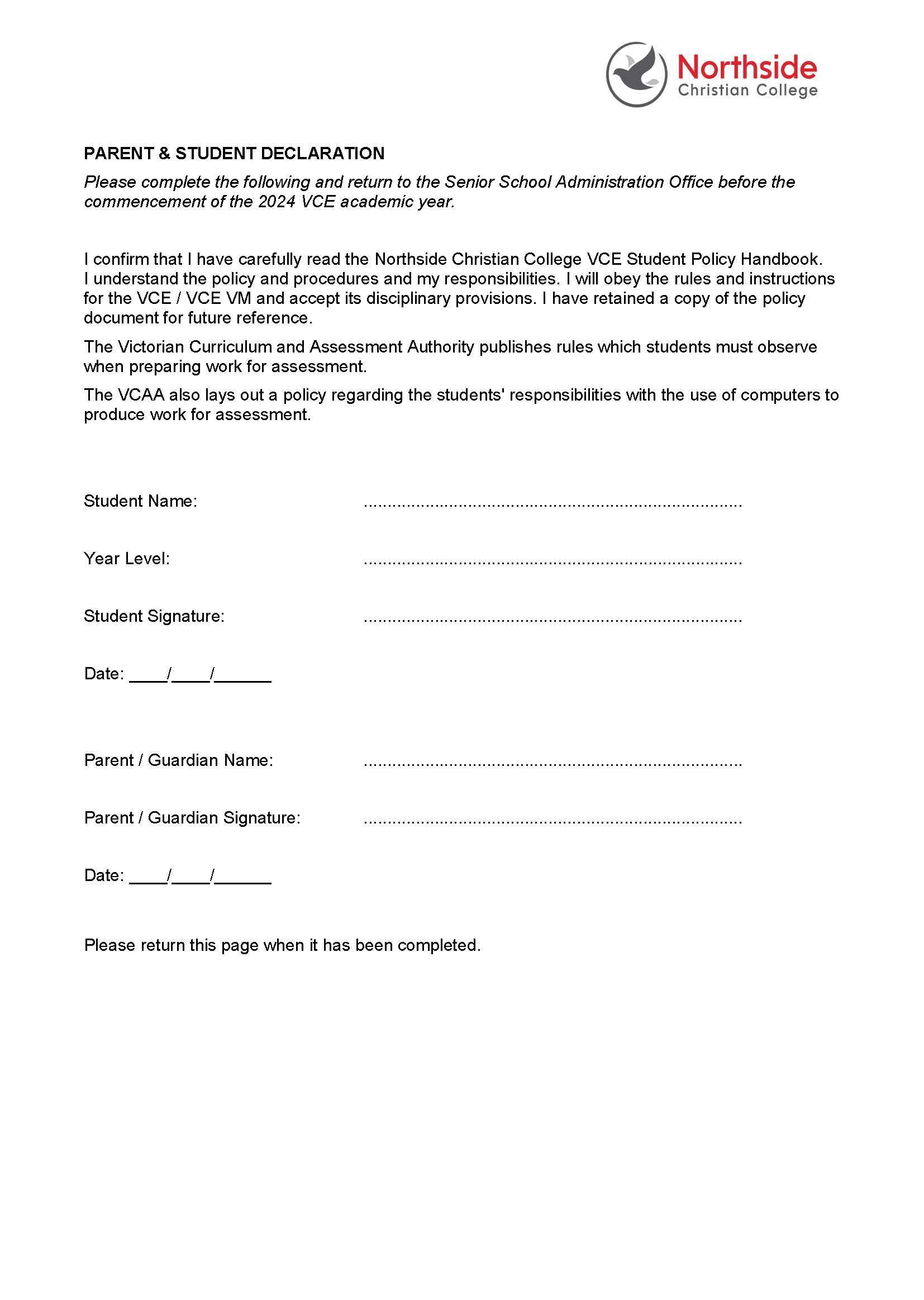
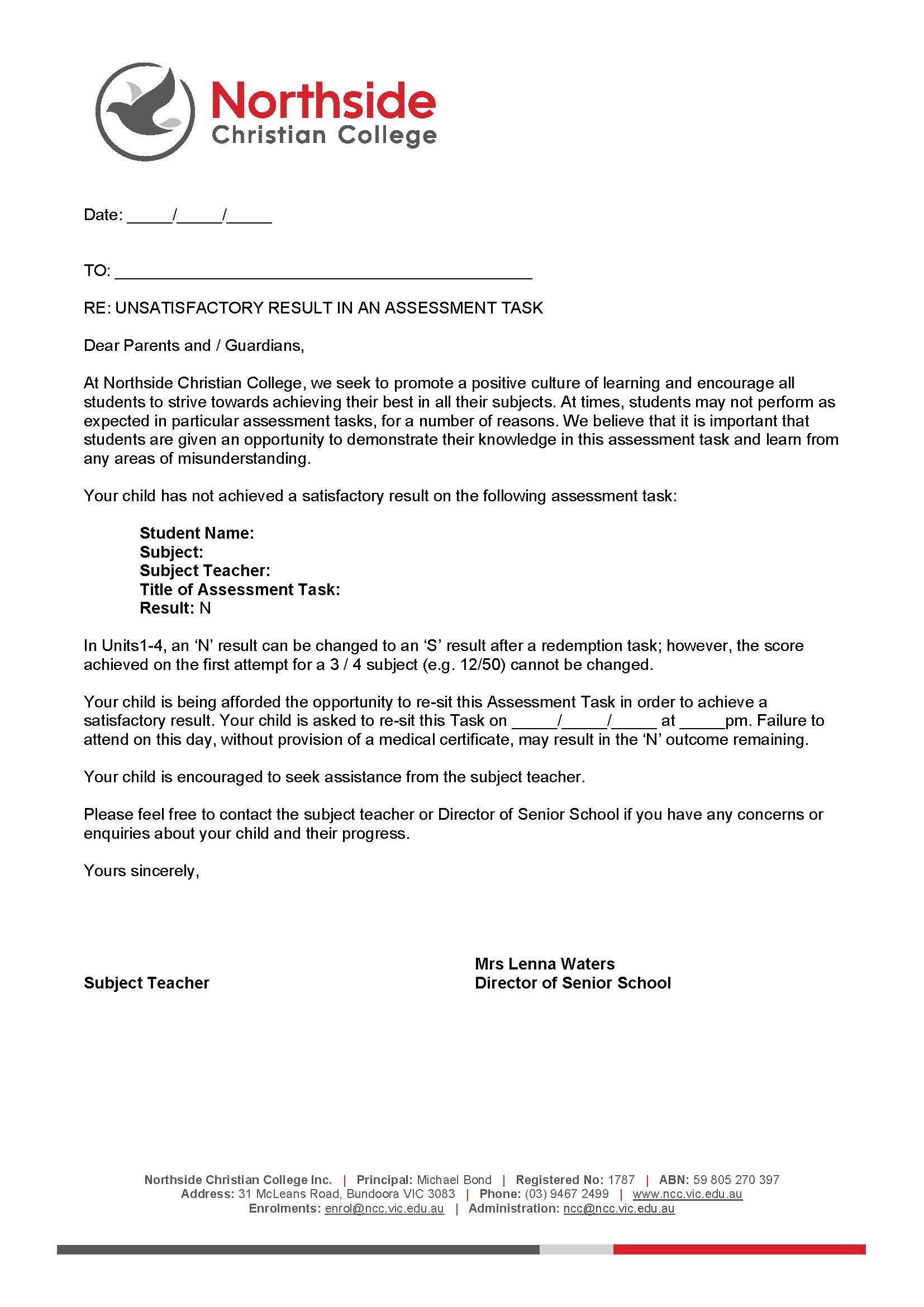
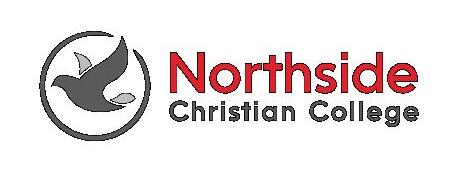
EXTENSION OF TIME FOR VCE OUTCOMES
Student Name
Subject Unit Number
Details of work to be completed
Original Date for submission: / _/____ Requested Date for submission: / /
Please explain the reason for seeking an extension of time Attach any evidence supporting your request such as a medical certificate or funeral notice is requested
Student Signature
Parent / Guardian Signature.
Extension Approved: YES / NO
Reason for refusal of request:
Teacher Signature.
Director of Senior School Signature
Copy returned to Subject Teacher: YES / NO
Copy returned to Student: YES / NO
Date: / /
Date: / /
Extended Due Date: / /
Date: / /
Date: / /
Please note that an application for extension will not be automatically approved Allow two days for administrative processing.
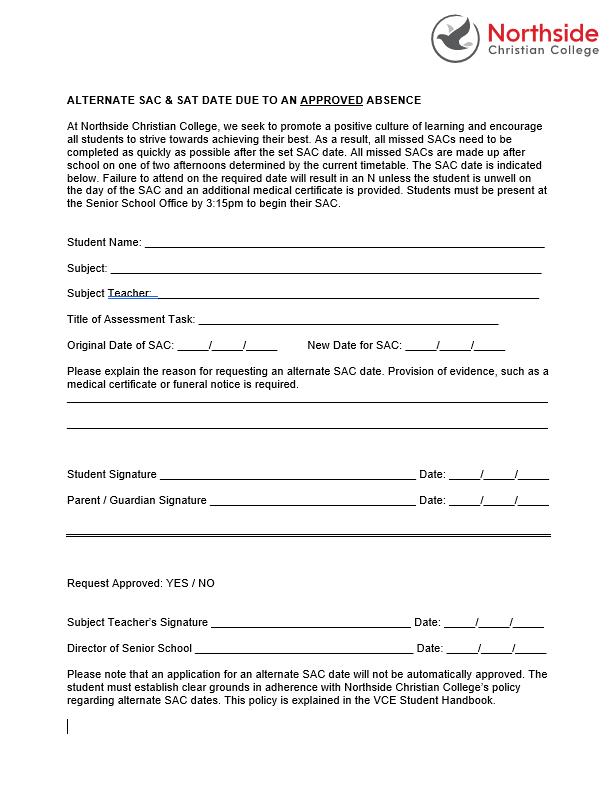
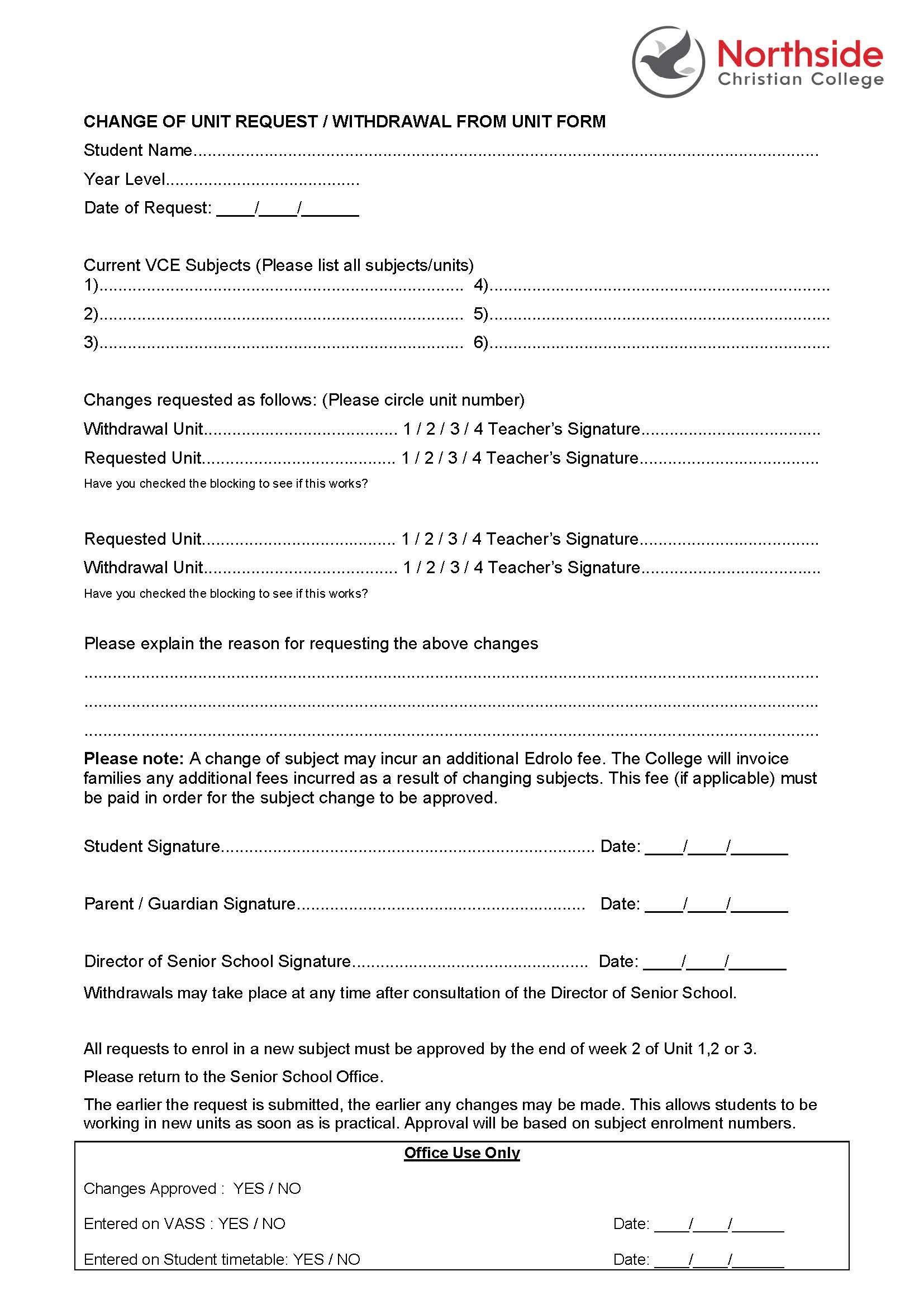
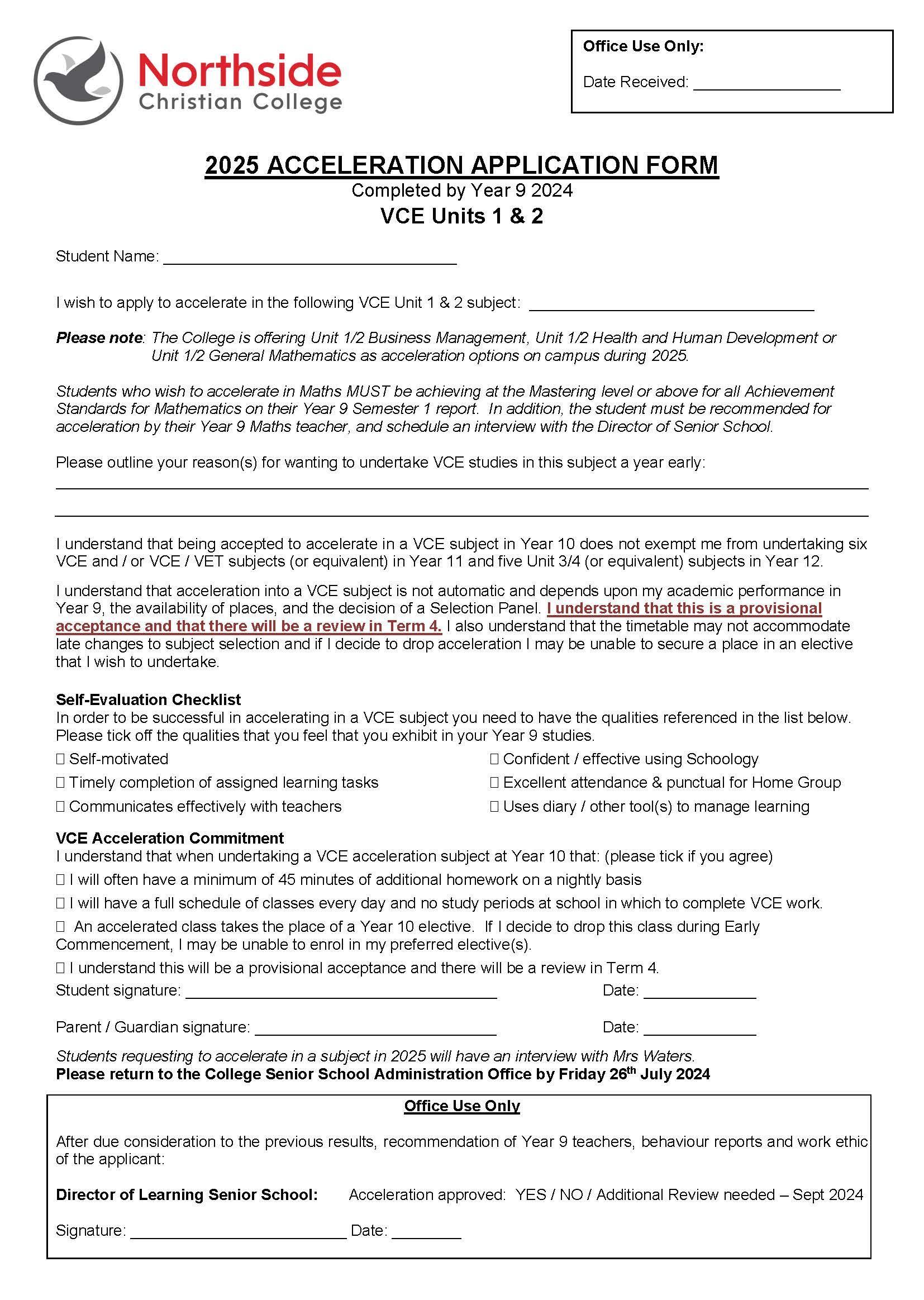
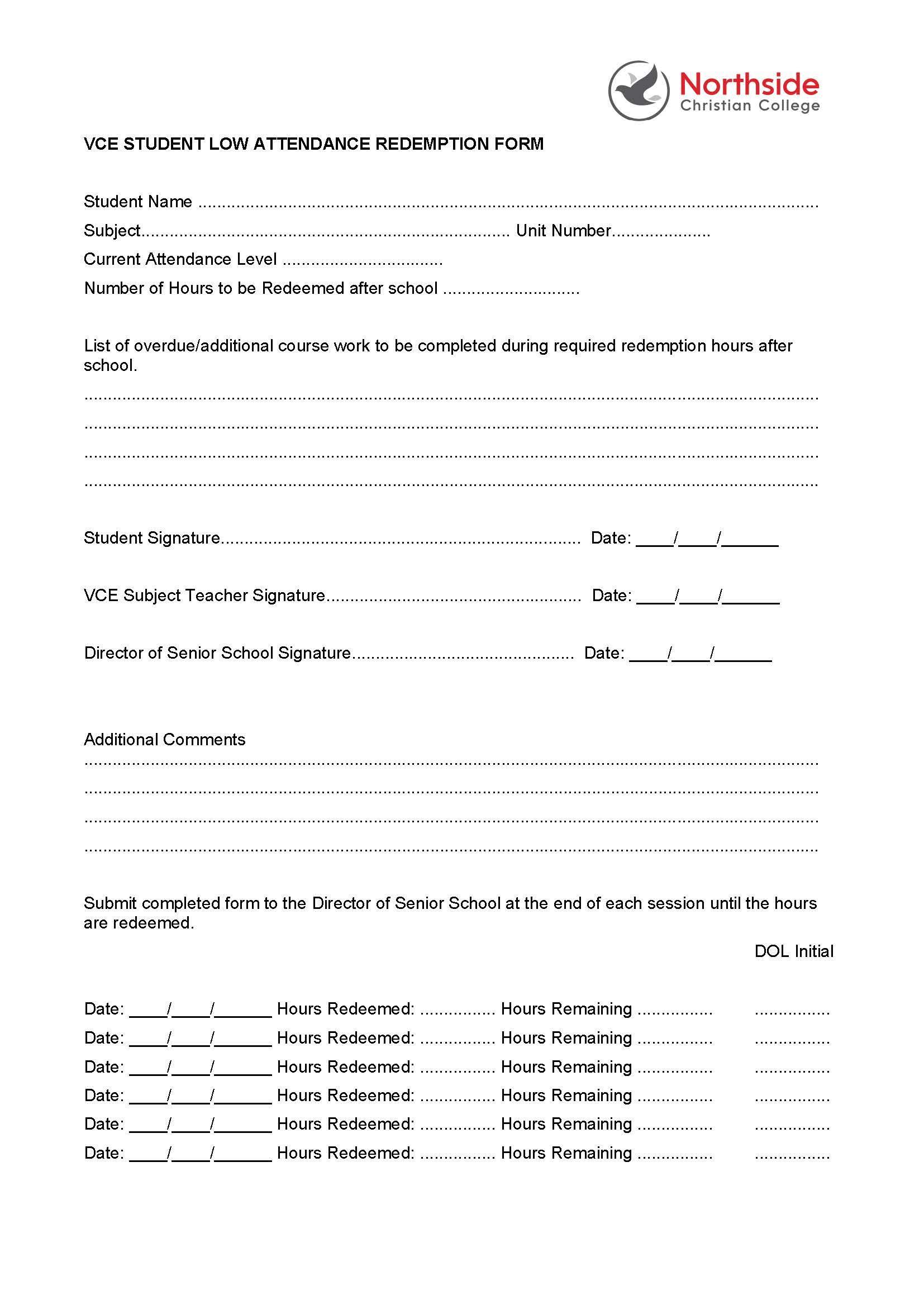
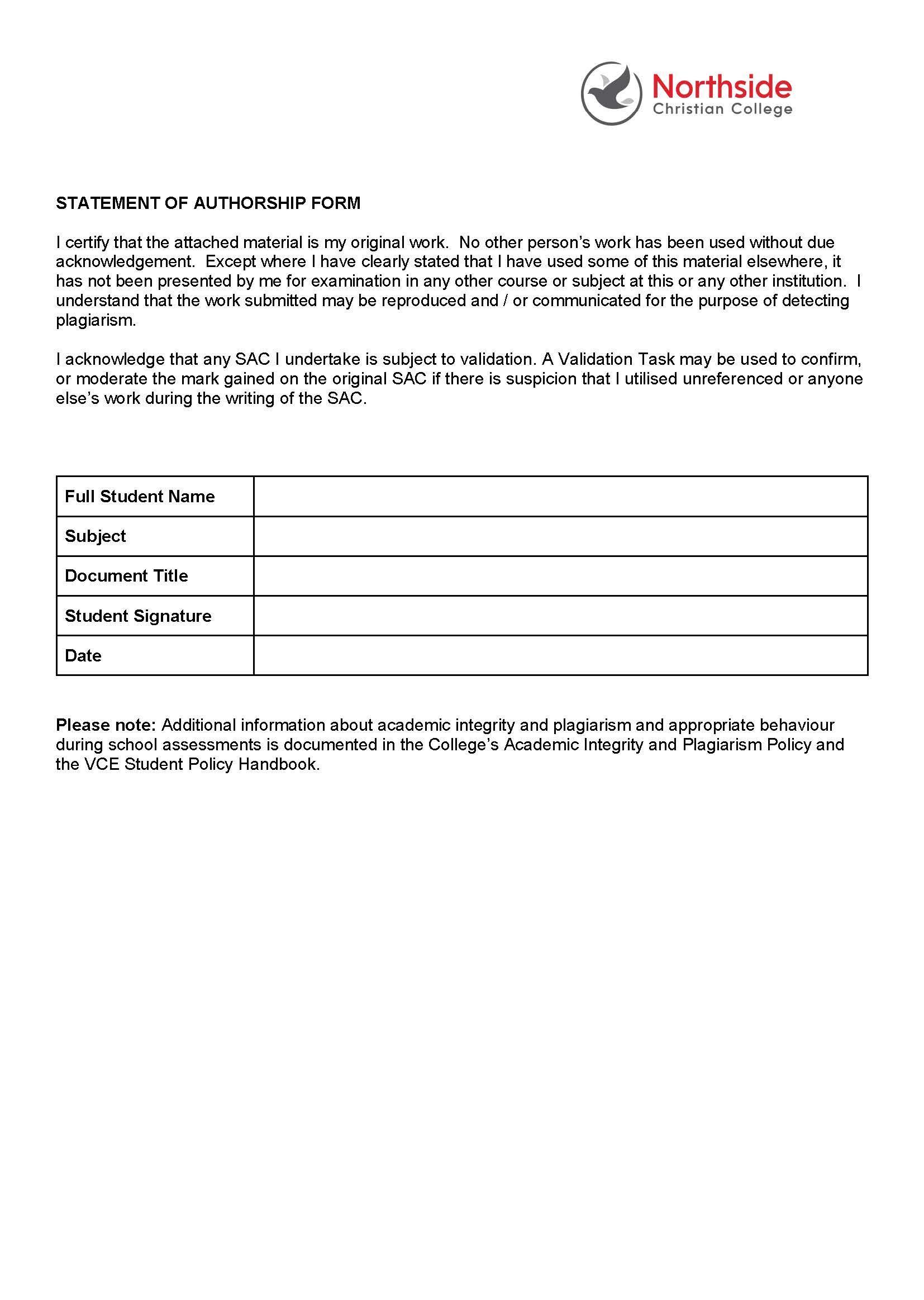
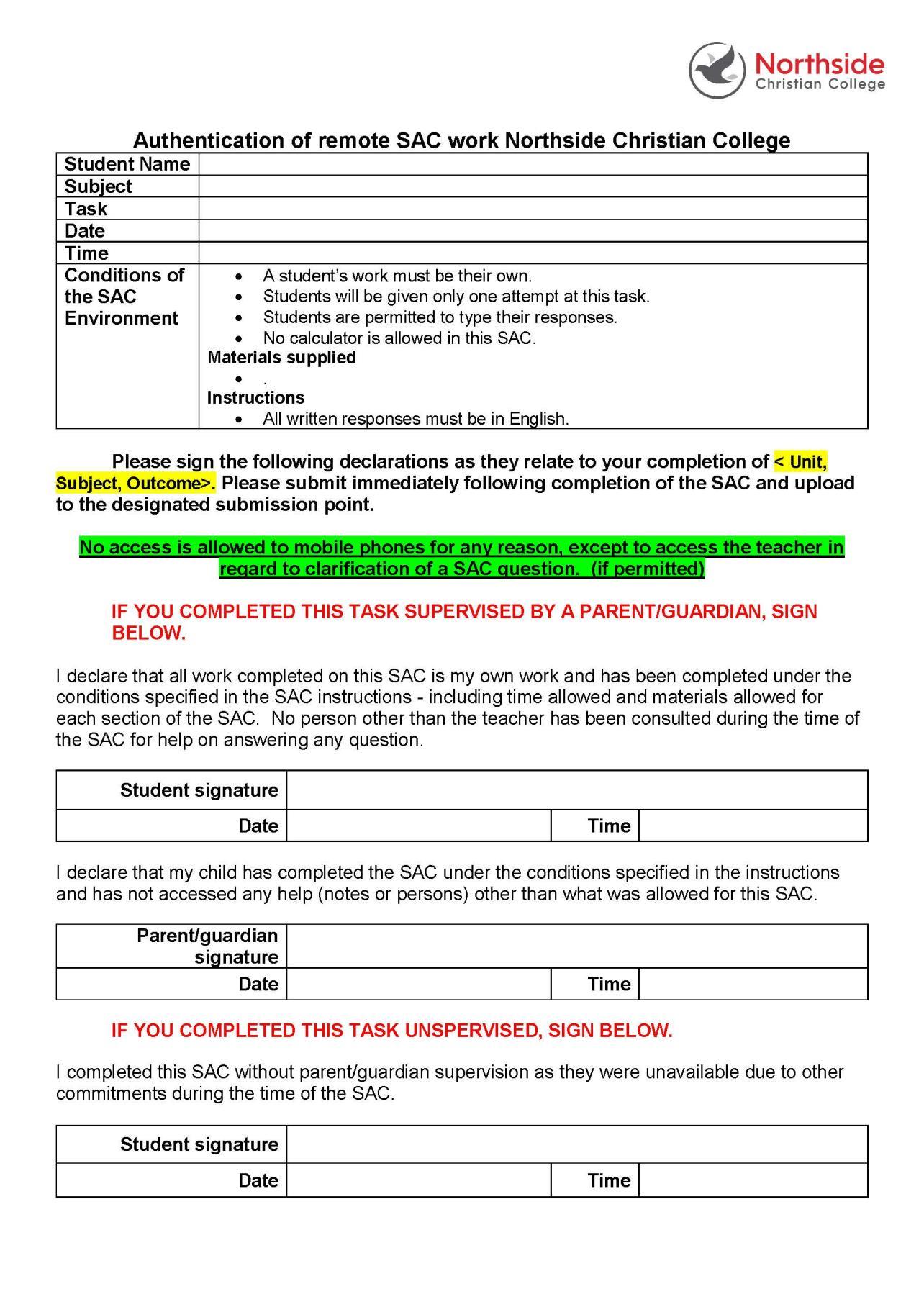
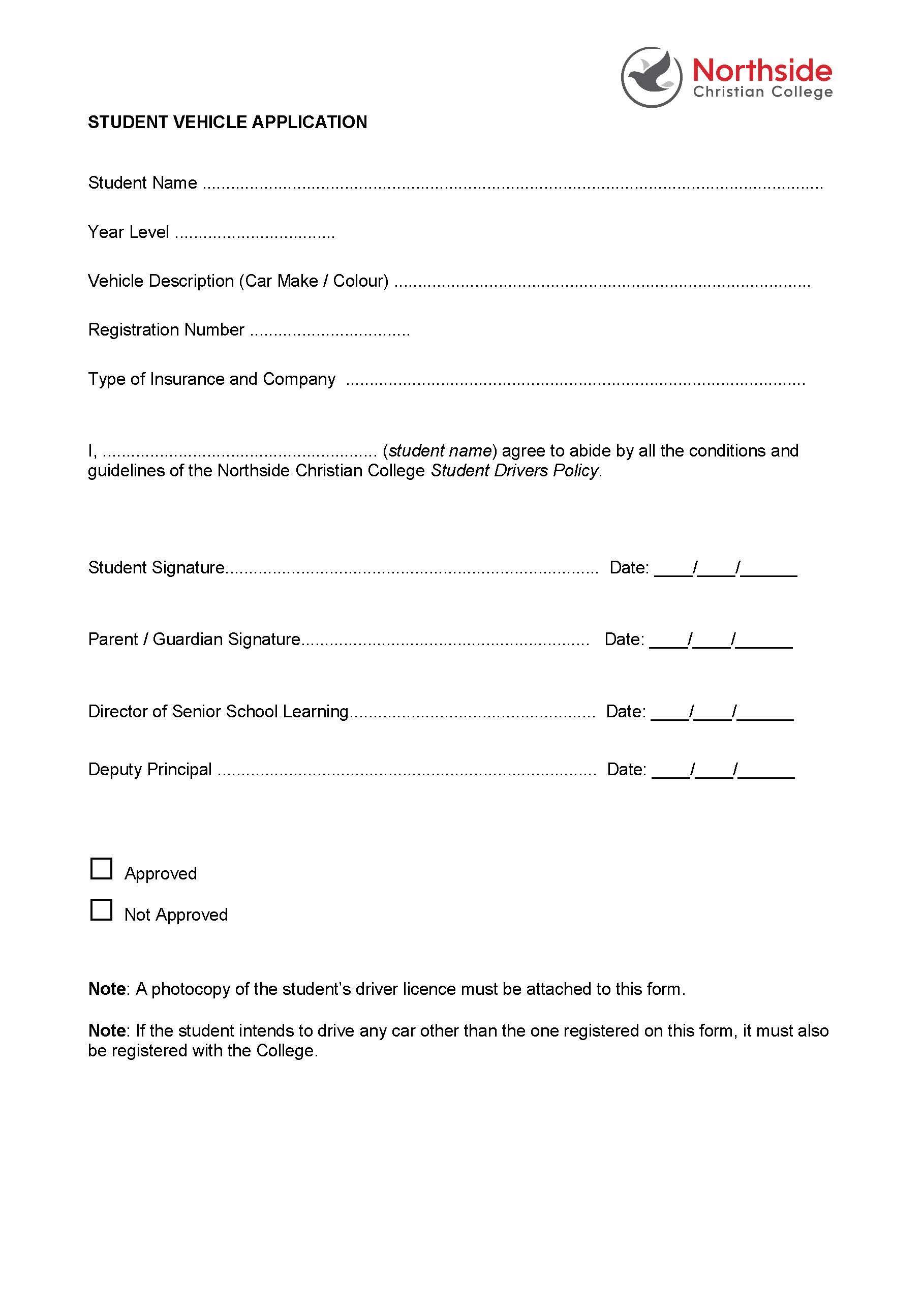
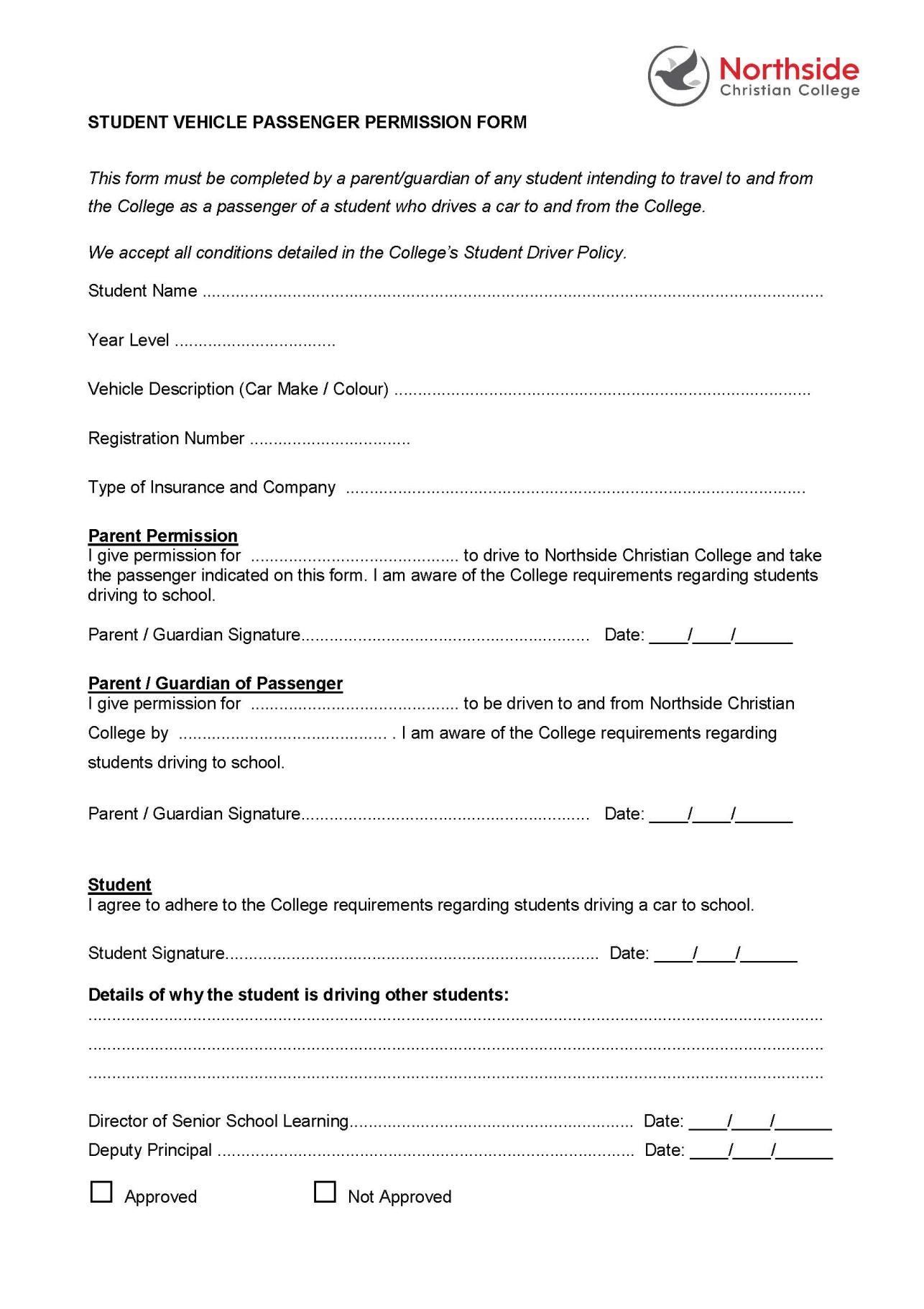
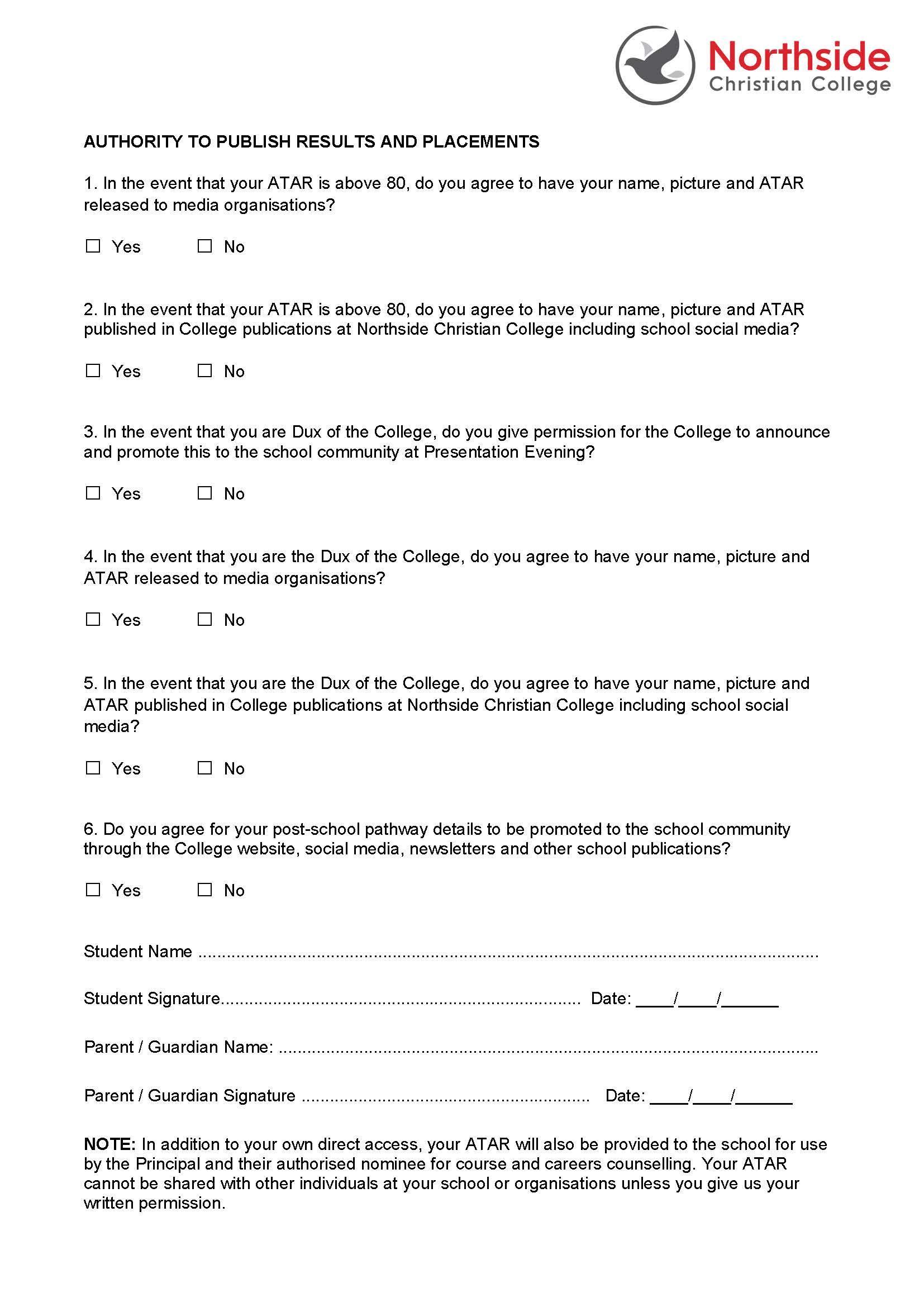
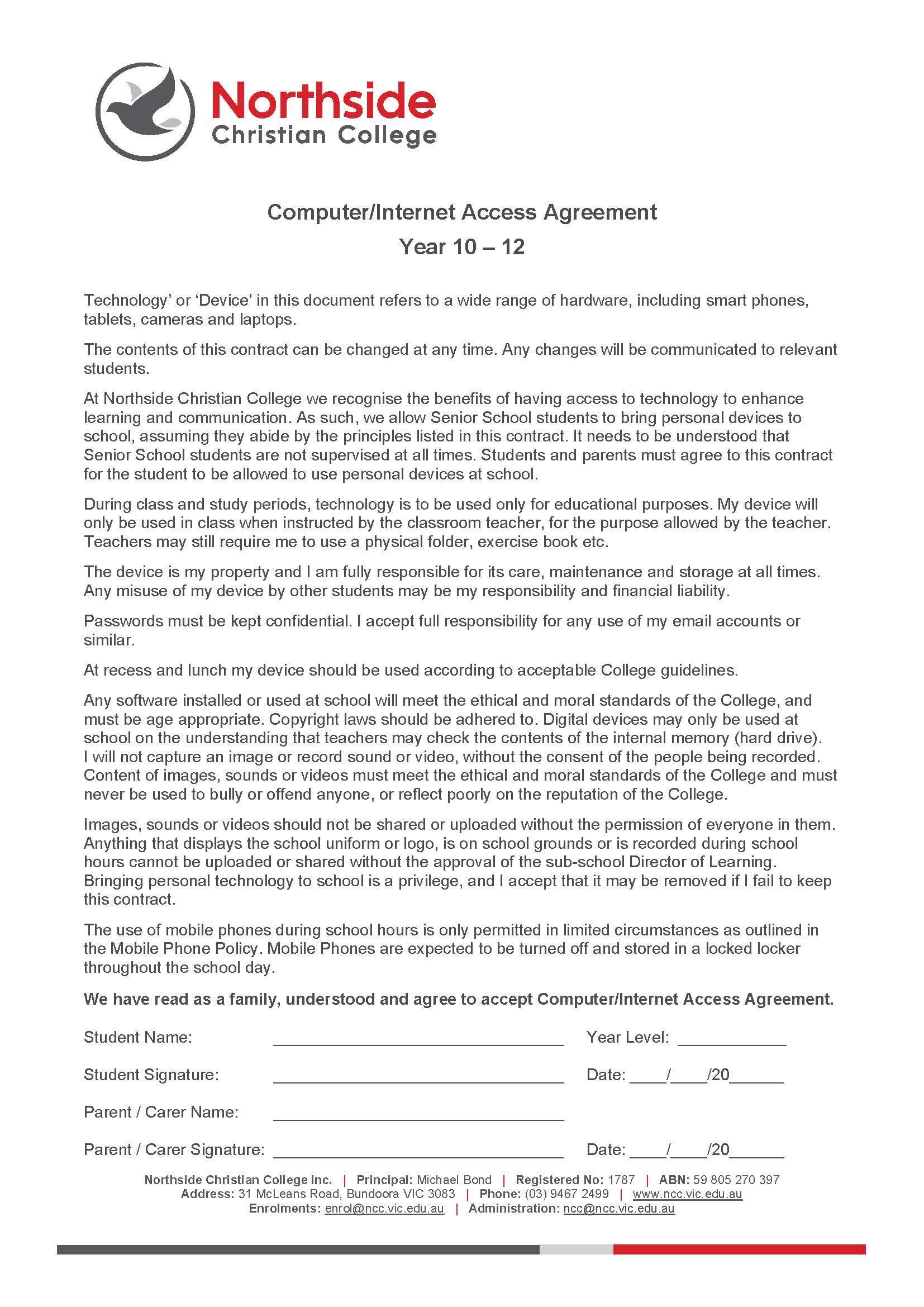
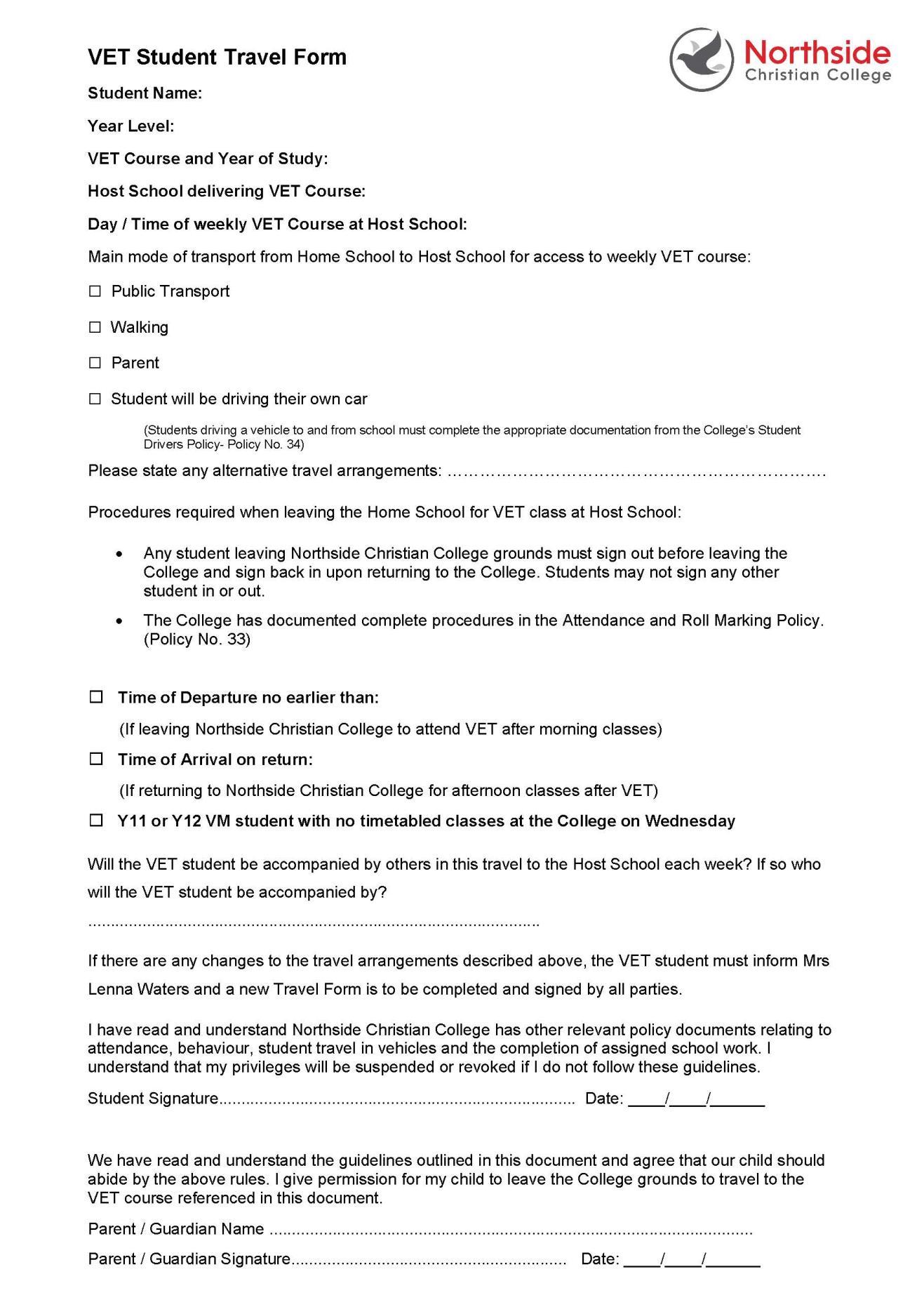
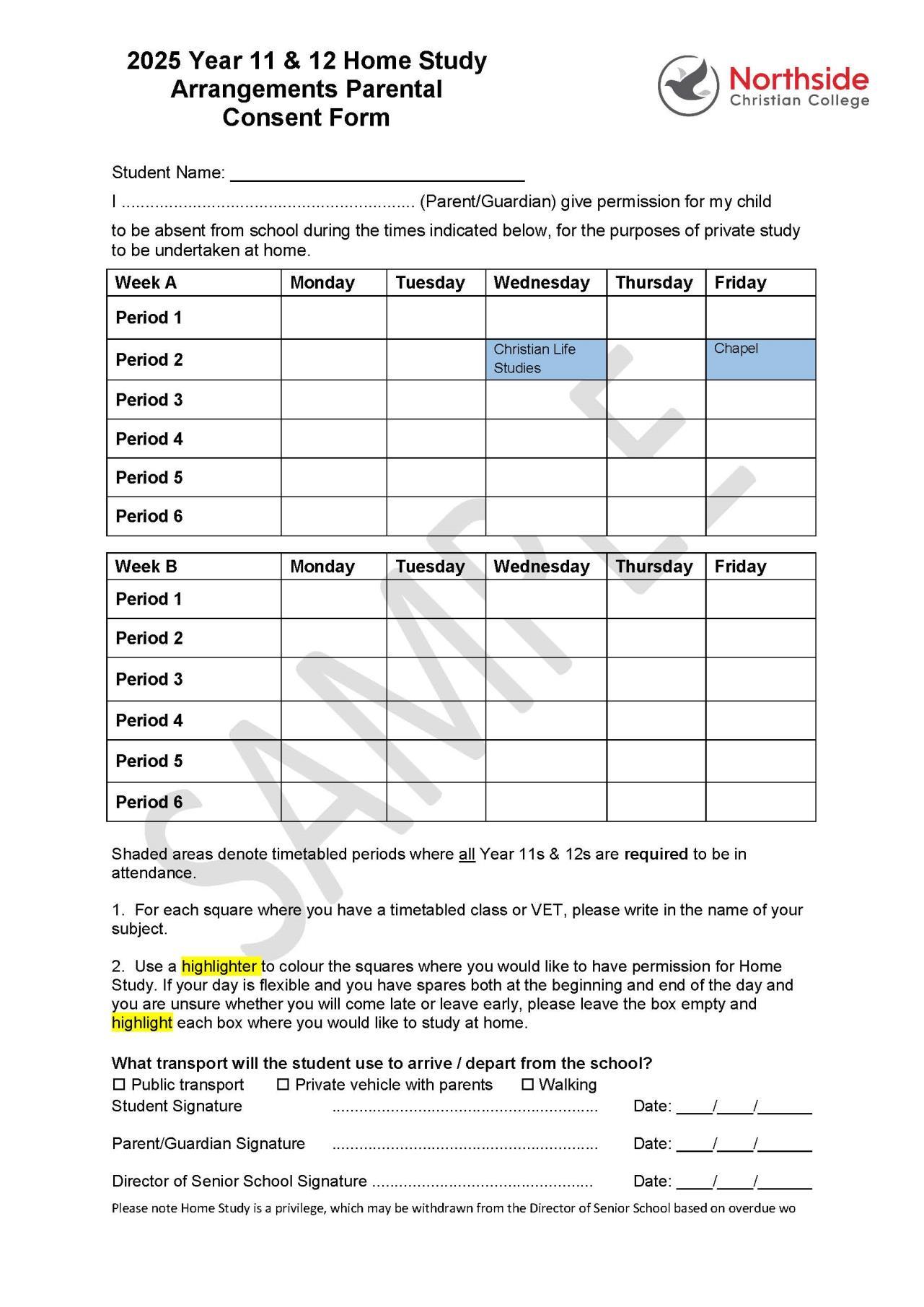
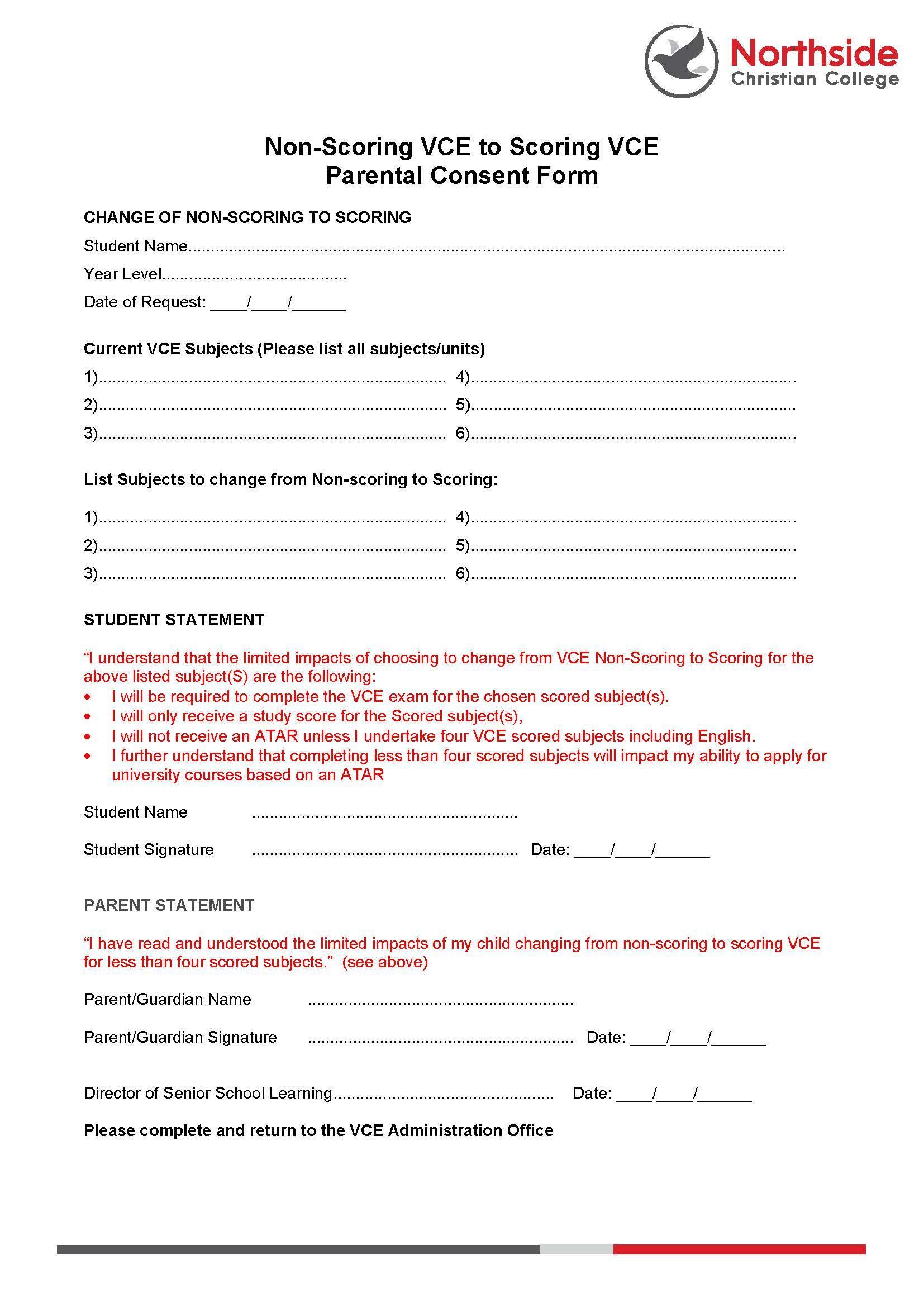
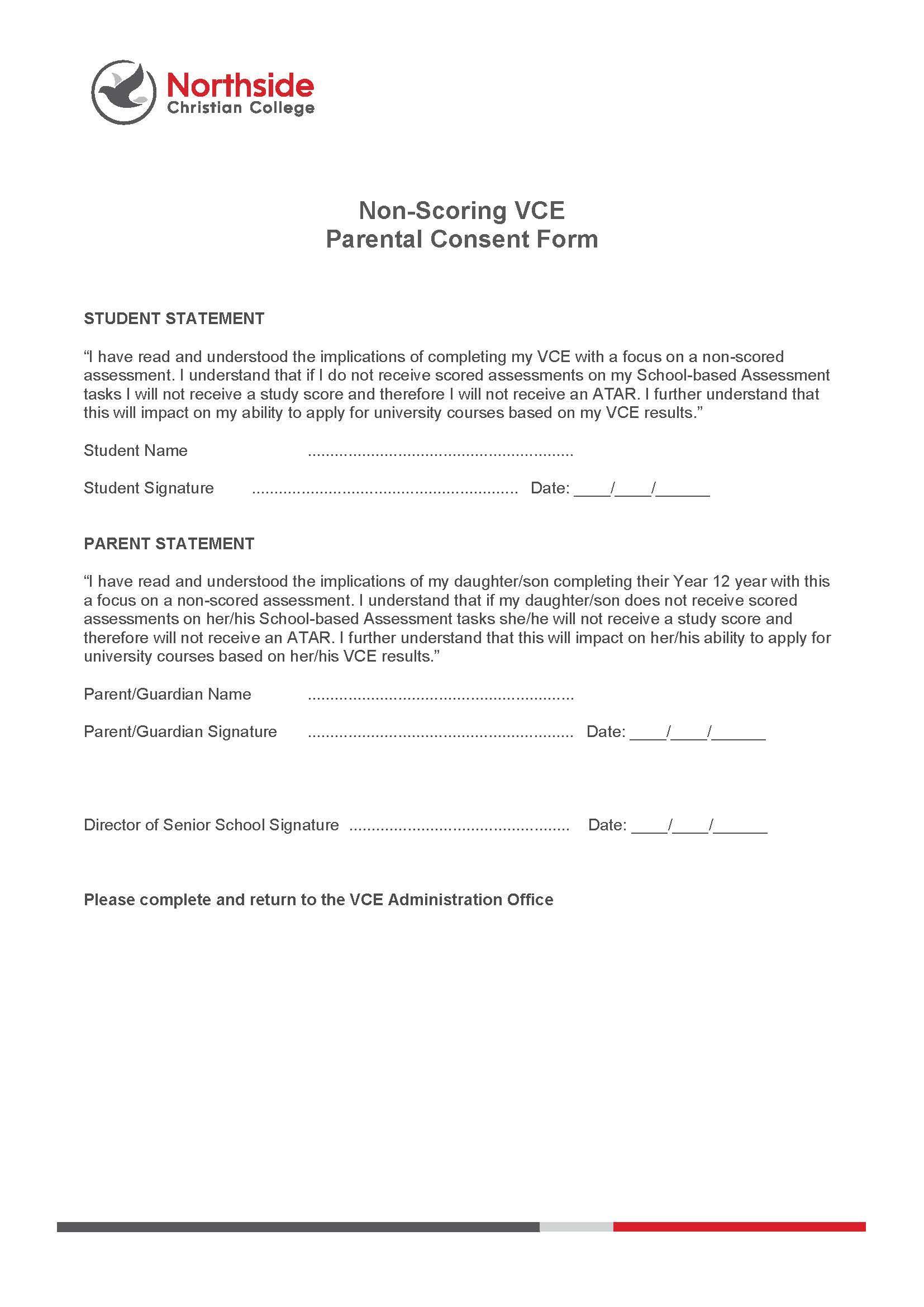
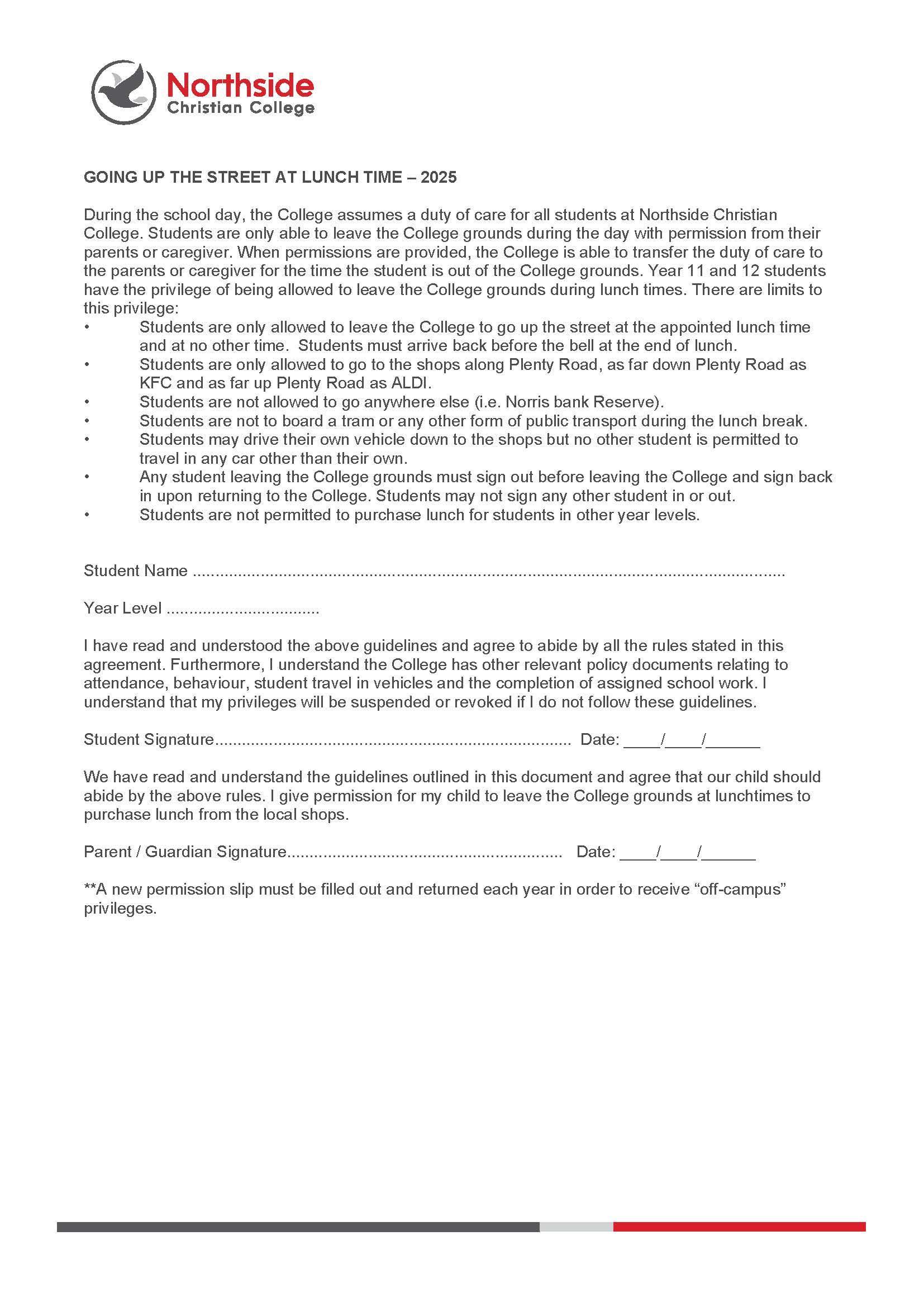
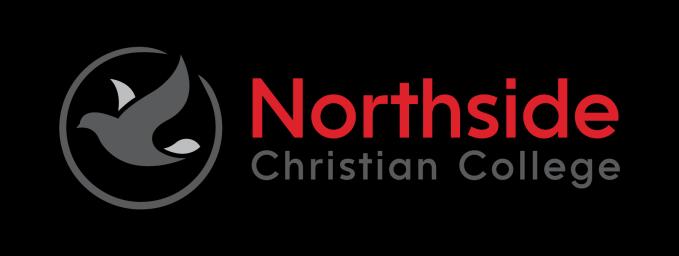
31 McLeans Road, Bundoora, VIC, 3083
www.ncc.vic.edu.au
